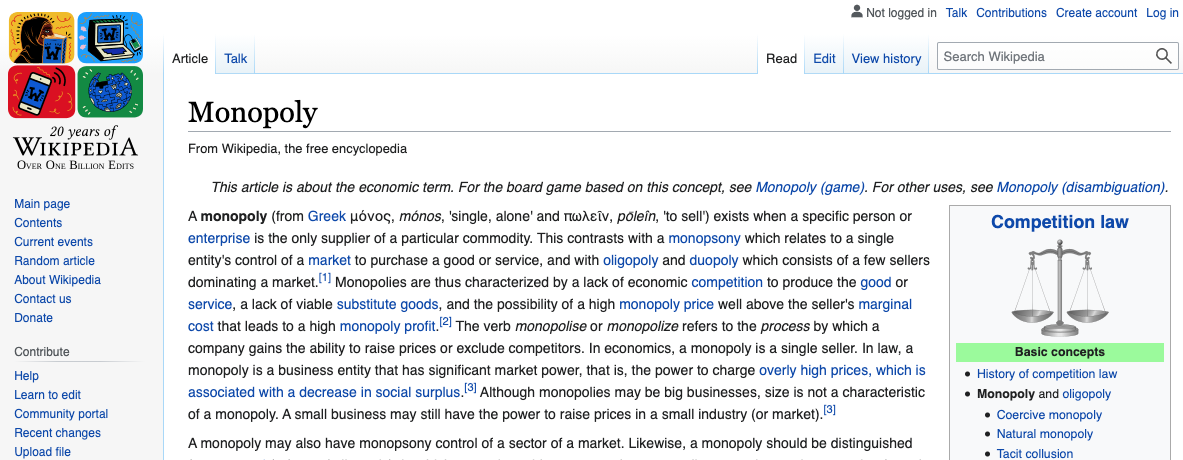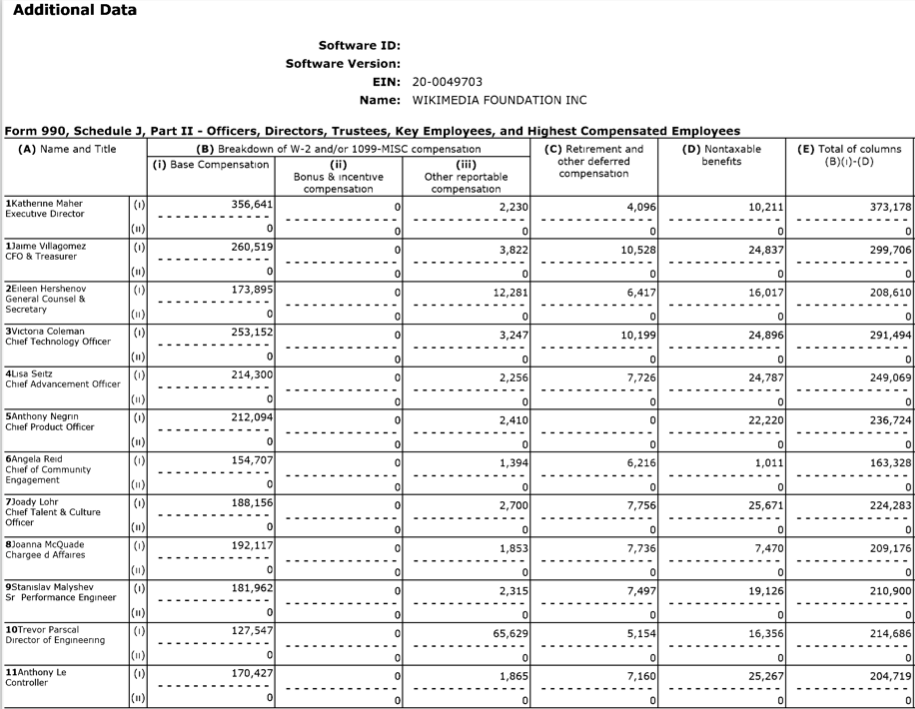Wikipedia: The Overlooked Monopoly naked capitalism

‘Low-quality anonymous “editors” combined with a Google tie-up turned an interesting experiment into an overlooked but destructive monopoly.’
Follow yvessmith on Twitter
Feedburner RSS Feed
RSS Feed for Comments
Subscribe via Email
SUBSCRIBE
2:00PM Water Cooler 7/16/2024 - 07/16/2024 - Lambert Strether
Targeting Corporate Landlords, Biden to Unveil National Rent Control Plan - 07/16/2024 - Yves Smith
Links 7/16/2024 - 07/16/2024 - Lambert Strether
UK Government and Israeli Energy Firm Are Preparing to Drill for Oil in Disputed Seas Off Falkland Islands (Malvinas) - 07/16/2024 - Nick Corbishley
A New Era of Endless Labor Shortages? A Critical Analysis of McKinsey’s New Report - 07/16/2024 - Yves Smith
Devastation in Gaza Poses an Increasingly Serious Problem for Starmer - 07/16/2024 - Yves Smith
2:00PM Water Cooler 7/15/2024 - 07/15/2024 - Lambert Strether
Israel’s Inertial Genocide - 07/15/2024 - Yves Smith
Investments in Hospital Infrastructure Reduced Mortality in the US South - 07/15/2024 - Lambert Strether
Posted onJanuary 20, 2021 by Yves SmithYves here. Michael Olenick sent this piece on Wikipedia along, not just for it being of genuine interest but also as a mental health break from the Biden inauguration media saturation. So enjoy!
By Michael Olenick, a research fellow at INSEAD whose recent articles can be found at innowiki.org and Blue Ocean Thinking

You’ve never heard of Wikipedia’s Tim1965 or the countless others like him but they quietly affect your life and your perception of the world. Tim is a Wikipedia “editor” who brags, in bold, that on June 2, 2019, he made his 50,000th edit on Wikipedia. Just a few months later, on September 4, 2020, the Innowiki consortia I’m a part of got a front-row seat showing how lame that boast is and realized it highlights a serious but overlooked problem with Wikipedia.
What happened is, as these things go, seemingly insignificant enough I paid it no attention for a half year until I thought things through. Specifically, Tim eliminated some quotes I added about my favorite business executive, the late, great Archie McCardell, the worst CEO in history. I’m somewhat of an expert on Archie, having the misfortune of studying and writing about him and even naming an award after him, the Archie McCardell Award for Horrendous Management. Come to think of it, Tim deserves an Archie Award.
Before we get back to the problems about Tim and Wikipedia, the overlooked monopoly, some review is probably in order.
Archie was CEO of Xerox when the Xerox Palo Alto Research Center (Xerox PARC) was set up. It’s the division that gave us pretty much everything interesting about modern computing. He became the President of Xerox in 1971 and for three years, the firm recorded record profits just as it had the prior two decades. Then, with Archie’s management style in place, all quickly started going south and Xerox never recovered. They never commercialized the inventions at Xerox PARC that included, among other things, the graphical user interface, the laptop, ethernet networking (WiFi is wireless ethernet), object-oriented software, or all sorts of other cool and wildly profitable stuff. Steve Jobs swiped stuff from Xerox PARC and used it to create the Mac. Bill Gates knocked that off to make Windows.
Back to Archie; he laid the groundwork for a few years of wretched sales during which they blew the future and ceded the copier market to Japan. As a reward, Archie was recruited by Booz Allen Hamilton to lead International Harvester, then one of the largest businesses in the US. With a starting salary of $460,000, he was one of the highest-paid executives in the US. Archie also received a then unheard of signing bonus of $1.5 million and a low-interest (at the time) loan of another $1.8 million. Before Archie, International Harvester was a profitable, stable family business but management consultants wanted “a high-powered executive from the outside.”
So, how’d the guy that ensured Xerox wasn’t Apple do at his new gig? Every bit as wretched as you’d imagine and worse. He cut costs and poked the lead union, the United Auto Workers (UAW), in the eye. They responded with a 172-day strike.
By the time the strike ended, Harvester lost $479.4 million-plus another $397.3 million the next fiscal year as a result of the fallout. Archie borrowed money to stay afloat, eventually bloating the firm with $4.15 billion in debt. Eventually, he cut the budget another $200 million and demanded further union concessions while paying out $6 million in executive bonuses. The union agreed to the concessions on May 2, 1982; Archie was fired the next day. International Harvester was forced to sell their crown jewel, the farm equipment division, and renamed what remained Navistar.
Archie’s feelings about his performance (copied from my original articles):
“I don’t think we made any one major mistake,” McCardell said in a 1986 UPI interview. “I feel very good about my years at Harvester.” Later, he adds, “I think I was underpaid.” In a different interview with the New York Times he said: “I think I rate myself superb.”
Pundits aren’t as enthusiastic. One speculated he might have been carrying out “an industrial sabotage operation.”

Archie McCardellBack to Tim & Wikipedia
My Innowiki project is edited by a small number of people. We typically write under the moniker Ruby Day because WordPress requires attribution. Tim, with his 50,000 edits, apparently watches the Archie McCardell page for edits. He deleted the quotes above and justified the deletion writing: “removing biased source (self-promotional edit, using an article written by the editor), linked to nonreliable wiki source…”

Tim’s comments … preserved for posterity
So, what’s the problem?
Well, for one, the source, here, clearly has all information including quotes well cited. That Innowiki entry ranks #2 or #3 in Google, depending on the day, with Wikipedia ranked #1. That is, there’s no point in self-promoting: there’s no higher placement for that page except to overtake Wikipedia which isn’t going to happen. All that was apparent to anybody who did the slightest bit of research, something Tim1965 clearly didn’t bother to do before pressing delete and justifying it with baseless ad hominem insults.

There’s Innowiki at #2, far below all those pictures (several from our own article)This happened in September and I shrugged it off. After all, there really is no SEO benefit. Adding those quotes only helped contextualize Archie McCardell, improving the page to better reflect his mindset that eventually metastasized into modern management practices. But I have a family, a day job, my other writing, and a life; no need to have a war with some dude who has the time for 50,000 Wikipedia edits.
Something didn’t feel right and I eventually figured it out. That Wikipedia entry about Archie, presumably written by Tim, doesn’t contain those quotes and materially misstates other information. It’s oddly appropriate that a key article about Archie is run by a lazy researcher exhibiting poor scholarship but it seems inappropriate for Wikipedia.
More to the point, why is some anonymous creep in a position to run around hurling ad hominem attacks? Why should some dude who has the time to make 50,000 Wikipedia edits and goes by the anonymous “Tim1965” be in a position to whine about that the author of a third-party source filled out a Wikipedia entry (which isn’t even entirely true, though that’s a different issue)? Especially because he’s doing exactly the same thing? What gives him the authority?
I thought about it and realized: Wikipedia’s source as a monopoly is what.

Wikipedia Is a Monopoly
And it’s not a harmless one, either. Editor ranks are filled with people just like Tim1965. They’re unpaid basement dwellers who have some motive to spend enormous amounts of time “editing,” a process that invariably often includes the mass deletion of useful and accurate information. Look – maybe Tim et. al. would fine if the attribution of my edits were to other primary sources but, of course, that would cut out other secondary sources. This happens to be exactly what monopolists do. Google at least still links to underlying websites even if, as illustrated above, they push them below a barrage of pictures.
But Wikipedia is a non-profit with volunteers, huh? Nonsense. Wikipedia’s no-pay policy is a bug, not a feature. Facebook, Google, and Amazon are also monopolists but at least they allow some people to buy food, shelter, and diapers; Wikipedia doesn’t. Wikipedia is not only a monopoly; it is the very worst monopoly, one that saps wealth, erodes knowledge, spreads false or misleading information, allows anonymous edits, and returns nothing to the economy. It props up Google’s ability to circumvent eyeballs strengthening their own monopoly (again, as illustrated in the screenshot above). Why does anybody think this is a good thing?
Almost nobody recognizes the problem or calls out Wikipedia as a monopoly despite that it obviously is. There is some unspoken rule that Wikipedia is good and mustn’t be challenged. That tie-in with the high Google ranking? Sure – Wikipedia deserves it, goes the thought. Why? Because they don’t pay people and don’t accept advertising so there are no conflicts of interest, right? Wrong.
Only the very naive believe somebody would bother with 50,000 edits for no gain. A quick search for Wikipedia experts returns countless people who can help “manage” one’s Wikipedia presence to see how plenty of these “editors” are paid. It’s the same model as Google or Facebook but a whole lot less honest. That doesn’t mean many people don’t volunteer their time: I write plenty for free. But there’s a big difference between releasing a newsletter/blog post once or twice and week and 50,000 edits. There are other ways to profit from an edit count with none of them adequately disclosed.
Sure, Wikipedia has a code of ethics. Even that’s a joke. I’m an American living in France so often surf the web using a VPN to get English-language pages. I have to turn the VPN off to make Wikipedia edits. They block VPN edits better than any other VPN blocker I’ve ever seen. I can watch Netflix as if I’m in the US but can’t even login to Wikipedia with the VPN on. This is a minor inconvenience to me but literally deadly to, say, dissidents of many countries.
Just how common are people like Tim on Wikipedia? Plenty common and plenty of a problem. The way most of them get to those high number of edits is by reckless deletions — digital vandalism — as I’ve illustrated above. Wikipedia even has a term for them, deletionists. They used to have their own Wikipedia page when I first came across the term but deletionists deleted it. Instead, in a self-righteous bit of false equivalency, they merged it in with a page of so-called “inclusionists” who are people that want to actually expand knowledge.
Deletionists define adding information they may not like — I suppose including links to other well-documented articles in other places — as “vandalism” and edit for “appropriateness of content,” a vague-standard that sounds like something from the North Korean Ministry of Truth. Borrowing from Richard Stallman, knowledge should be free as in speech, not free as in beer for those who can afford it. Wikipedia has it exactly backward.
Monopoly Busting
There’s finally some momentum to police “Big Tech” monopolists from both the left and the right. We’re used to seeing Bezos, Zuck, Pichai, and Cook uncomfortably suited up and testifying on Capitol Hill. Lately, the people asking the questions even seem to be more tuned-in to issues that matter.

Zuck with his too-tight top-button looking his head looks like it’s about to explode.Ignoring Wikipedia, which is every bit as much a monopoly and a monopolist as the rest, is a dire mistake. There is nothing positive about sucking away users from high-quality content published by individuals, small blogs, or focused wikis. They’re not providing some type of public service by providing free content for Google to monetize without worries about being sued for copyright violations (and, surprise, Google funds Wikipedia). Wikipedia went dark to prove the point they’re vital and immediately missed. However, by doing that, they simultaneously proved another point: they’re a monopoly.
Next time tech execs are called up to testify, Jimmy Wales should join the gang. Until then, Google and the rest should work to promote some diversity of information by pushing Wikipedia’s rank down or even throwing the site off search results entirely; if people want to search Wikipedia they can go there directly. In its current state, all Wikipedia does is concentrate, corral, and offer up eyeballs to their for-profit monopolist cousins while purposefully harming lesser-known sites.
Still not convinced and think Wikipedia is a cute and cuddly non-profit? Let’s keep going. Wikimedia Foundation, the parent of Wikipedia, brought in $113 million on their last tax return, filed 2017. They don’t pay writers but do pay a lobbyist. Executive Director Katherine Maher earned $356,641. The CFO and Treasurer (of the non-profit volunteer website) earned $260,519. The lowest-paid executives are Chief of Community Engagement Angela Reid ($154,707) and Director of Engineering Trevor Parscal ($127,547). Yes, you read that right: the two people in charge of the community that creates the content and keeping the site lit up — the only two things the vast majority of us care about — are, by far, the lowest-paid.

Wikimedia’s 2017 Form 990There’s something poetic about a seemingly insignificant edit on the Archie McCardell page reframing the core brand of Wikipedia as the monopolist that it is. If any executive could screw up something from the grave, a dozen years after his death, it’s Archie. Still, he also has a history of leaving interesting ideas in his wake of destruction. One of those ideas is that it’s long past time to recognize the value of researchers and writers, to label Wikipedia the monopolist that it is, and to reorient public perception towards the site to recognize its economically destructive nature on individual independent researchers and journalists.
We need information and education more than ever. That’s my commitment.
— Katherine Maher (@krmaher) November 9, 2016
I agree wholeheartedly with this pinned tweet by Katherine Maher but disagree entirely that Wikipedia does this. Enabling creepy anonymous unpaid editors and providing free content for search engines to bypass independent writers achieves the opposite of this goal.

Subscribe to Post Comments 66 comments
- PlutoniumKunJanuary 20, 2021 at 6:50 amThat story sounds similar to one I know of – a few years back a very respected scholar of Japanese cinema decided to do major improvements to the page of one of the best golden age Japanese film Directors as this page had become the default for a lot of students, but was filled with errors. He published his draft in an informal manner to allow others with a knowledge of the period to comment (I was one of them, although I’m not an expert I’d written a little on various blogs on the topic). I read it through and it was a superb piece of work, short, but backed with useful detail and fair and balanced analysis of the directors life and work. Pretty much the ideal Wikipedia entry for a major artistic figure.
Once published though he was put though a hell of editing by someone like ‘Tim1965’. Despite several people writing to Wikipedia to point out that the academic author of multiple well reviewed books on the Director and the period and had been scrupulously fair and accurate in his submission, and ‘Tim1965’ was… .well, someone called ‘Tim1965’ (or whatever), Wikipedia never responded and allowed the edits to stand. He said it was one of the worst experiences of his professional life and he vowed never to use Wikipedia again.
My only problem with this article is wondering how the problems with Wikipedia can be addressed. Its a fantastic resource, and I use it multiple times a day, but I’ve become increasingly suspicious of some of the entries on important topics. 60. Michael OlenickJanuary 20, 2021 at 7:14 amSome changes I’d suggest: * Deletions should not count as edits. Do not provide any incentive to delete material. * Do not “lock” pages except for the most controversial subjects. Archie McCardell or the Golden Age of Japanese Film Directors needn’t and shouldn’t be at the mercy of Tim1965 or anybody like him. * For any editor with authority, require real names authenticated with government-issued IDs preferably linked to real-world bio’s. The anonymous contributor stuff is a fallacy; they don’t even allow people using VPNs to edit. * Every editor with authority should have one or more senior editors they are accountable to who could review nonsense like what Tim did (if he did it to me there must be plenty of others in that batch of 50k edits). * Keep track of verified errors, ad hominem attacks, and similar nonsense — not just a raw edit count — and add/remove editor privileges accordingly. * Push for involvement from more normal users; not just those who have time/resources to make tens of thousands of edits. The fanatics block the sun. * Demand funds from Google for the right to republish Wikipedia content and use it to hire professional editors. The editor-in-chief (Chief of Community Engagement) should be the highest-paid person there. * Push Google to use Wikipedia entries as a last resort; not a first.
In short … it’s time for Wikipedia to grow up. It is a great resource for things like objective facts. It’s especially useful for timelines. For anything subjective, it becomes iffier. And, as illustrated by deletionists deleting the page on deletionists, they need to weed. 61. AlexJanuary 20, 2021 at 8:25 amAn editor having 50,000 edits has no privileges whatsoever compared to an editor having 5,000 edits because of their higher edit count, so there is no particular incentive to inflate it, other than to brag about it, which very few users do.
I propose a simple experiment: let’s reinstate your edit replacing the link to innowiki to the UPI and NYT links (as required by the rules) and see if it survives. If it does then the problem is with following the rules and not with some ulterior motives. 62. EdG1955January 20, 2021 at 12:54 pmI agree, Alex. The NYT article is behind a paywall, so that may be a problem. But the UPI article is freely available. 63. AlexJanuary 20, 2021 at 2:24 pmA paywalled article is fine. Usually a good faith is assumed and as long as the source *can* be checked – in this case by a person with the NYT subscription – it’s considered legit. 64. Joe WellJanuary 20, 2021 at 1:27 pmBut if they are selling consulting services and using edit count as a selling point, maybe they still have value? 65. AlexJanuary 20, 2021 at 2:23 pmYeah, but then a lot of things can be used as a selling point (years of experience, “portfolio” of contributions). I do not believe that this is the main driving force behind the ‘deletionists’ actions. This was a response to the proposal to make deletions harder, the obvious trade-off is that a lot of crap that they remove (vandalism, advertisement, generally subpar content) would stay. 66. MichaelmasJanuary 20, 2021 at 9:29 pmWikipedia is what it is and anybody who isn’t an idiot knows that.
Back in the day, I used to be a journalist for outlets like TECHNOLOGY REVIEW, ARS TECHNICA, and that old dotcom era bible, RED HERRING, among others. It was implicitly understood by every writer and explicitly stated by every editor I knew about that no writer was ever to cite Wikipedia as a reliable source. Period. Fullstop.
Yes, everybody looked at it and used it as a cheat sheet. But nobody was allowed to use it as an authoritative source. And anybody who got caught promulgating misinformation because they’d got it from Wiki and hadn’t double-checked it had to do some explaining at the very least.
Granted, things have gotten much worse: outfits like Izvestia-on-the-Hudson and Pravda-on-the-Potomac are totally crapified these days and are hiring kids straight out of j-school who are utterly ignorant but are cheap. Still, I doubt policy on Wikipedia has changed that much. Even if it has, why would anybody with two neurons to rub together trust Wikipedia or the MSM about any information that matters without verifying it.
So Olenick strikes me as manufacturing outrage here to some extent here, honestly. 67. Michael OlenickJanuary 20, 2021 at 10:54 pmThe point of article, as the headline suggests, is the monopolistic nature of Wikipedia, not the accuracy or lack thereof. The site has become an unrecognized monopoly. 68. MichaelmasJanuary 21, 2021 at 2:38 amMr. Olenick,
Firstly, with due respect, Wikipedia simply is not a monopoly. Absolutely no one has to use it if they don’t want to, all the information it provides is available elsewhere, and every institution I’ve ever been around specifically advises workers or students not to use it as a reliable source.
Secondly, there is a current trend towards knowledge monopolization by platform capitalism that’s far more serious than Wikipedia, and on which you could more usefully focus your attention.
To whit: what’s the likely end game with all the so-called ‘open science’ platforms like Academia.edu, ResearchGate, Hivebench, Transcriptic, Emerald Cloud Lab, Science Exchange, Mendeley, SciStarter.com, and the rest?
I would suggest it has to be: –
a. Demonetization of much researchers’ work – especially in the biotech space –for corporations to exploit for free. This is obvious once you think about it — for instance, Elsevier is running its own ‘open science’ site — and it’s happening now.
b More ominously, it will only take one corporate actor with the deep pockets of a Google/Alphabet or a Microsoft to come along and roll up all these separate ‘open science’ platforms into one ‘Facebook of science’ This would then have a similar capability to direct and exploit ‘open’ scientific research to that which Facebook now possesses in the social media sphere.
Seriously. That is doable and both Google/Alphabet and Microsoft have already made moves towards doing it. 69. Michael OlenickJanuary 21, 2021 at 4:19 amA product or service needn’t be obligatory to be a monopoly and most monopolies aren’t. Neither Google, Facebook, or Amazon are mandatory products yet they’re all monopolies. One of the classic monopolists, De Beers, has a monopoly in jewels; those aren’t even a useful product, much less a mandatory one.
I don’t know about the open science platforms but I think I see what you’re saying: there are businesses — often operating under the guise of non-profits or being good for humanity — trying to drain all funds from researchers. Typically, their justification is businesses will see the research for free and hire the researcher as a consultant or some type of gig payment. I come across this myself — and I’m constantly looking for consulting work to supplement my small academic salary — so I understand the frustration. Of course, I’d simply rather be paid fairly as, I’m sure, do the other researchers you’re referring to.
This is a deeper issue but, for now, I’m focusing on Wikipedia because, frankly, it is the most egregious actor. They’ve designed the site to draw as many eyeballs away from smaller sites like this with no attribution and no pay. They collude, either passively or actively, with Google (see the screenshot Google search result, above) to make sure people are steered to Wikipedia. The more I think about it — and the more I read the defenders of it — the more I realize it’s purposefully predatory. 70. johnsonJanuary 20, 2021 at 2:15 pmIt seems like you don’t really understand what the phrase “ad hominem” means. It does not mean “someone said something I don’t like.”
Ad hominem takes the form of “this person has these bad personal traits; therefore their arguments are wrong.” This editor you take such offense to wrote nothing about you as a person and therefore did not engage in ad hominem. They justified their deletion of your edits by pointing out that the source is unreliable, which it is, because it’s a wiki. Wikis are defined in Wikipedia’s rules as unreliable sources because anyone can edit them. As such, Tim1965’s deletion was correct and his justification sound. Would you like to see an example of an actual ad hominem fallacy?
This guy lives in a basement and doesn’t get paid for his work. Therefore, his work is wrong.
You are the only person engaging in ad hominem in this dispute. Youvery clearly broke the rules of Wikipedia and, bizarrely, took the totally-correct enforcement of those rules as some sort of personal slight. 71. Yves SmithPost authorJanuary 20, 2021 at 8:42 pmYour comment is what Lambert calls a reader assisted suicide note, which we are only too happy to oblige. You have violated basic rules of argument, as well as made a personal attack on a post author. Each individually is grounds for blacklisting. Three together is a no-brainer.
First, you are Making Shit Up with your definition of ad hominem. It is any form of attack on the author of an argument, not just ones based on personal character. “He was posting something from his own article” is a fit. Nowhere did you or Tim1965 contend that Olenick was factually in error.
Second, you straw manned. Olenick’s argument that Wikipedia’s policies, including its policy on not allowing authors to provide links to their own text, is evidence of its monopolistic approach. If someone is a Noble Prize winner, or a Pulitzer Prize winner, they can’t point to their own work? The Columpbia Journalism Review pointed out years ago that the distinction between the MSM and blogs was increasingly spurious, since columnists and even journalists increasingly had blogs, some under the sponsorship of the publication, yet not subject to review. Similarly, Naked Capitalism has been regularly cited and re-reported in the MSM, and we are regularly invited to apply for journalism awards, yet according to Wikipedia, we are “user generated content”. Wikipedia would not credit us for breaking important stories, like the ones that got three separate government officials fired.
I have authors regularly send me links to their stories, including blog posts. Sometimes I publish them. Sometimes I don’t. Wikipedia with its zillons of editors is saying it isn’t capable of making similar determinations? This stupid policy supports Olenick’s claims that the intent is preserving Wikipedia’s information monopoly, and not stopping experts from engaging in self-promotion.
Third, as previously stated, your personal attack it totally out of line.
Goodbye. 72. floraJanuary 20, 2021 at 9:05 pm You very clearly broke the rules of Wikipedia and,….
( Catches breath after laughing, since the entire point is that the wiki argument from authority is a claim based on its questionably interested “authority” )… ohh kaay. 73. Michael OlenickJanuary 20, 2021 at 11:10 pmYves answered this one. Tim’s attack was ad hominem, attacking a website I work on with no investigation. Still, that’s besides the point.
As stated many times, these Wikipedia “rules” – which are sloppy at best – exist to preserve a monopoly. That is the point.
I don’t care about the edits or, for that matter, Tim1965 and his ilk except to the extent they pollute public discourse, which they do.
I do care about diversity of thought, opinion, bullying, and monopolies – especially of information or news. And Wikipedia is certainly a monopoly. Like most monopolies, there are often positive benefits — Google is outright magical — but it’s still a monopoly. 74. The HistorianJanuary 20, 2021 at 7:19 amI definitely agree! Wikipedia has problems, especially with current affairs and political entries, but on the whole, I’ve found Wikipedia to be excellent, especially its articles on science and mathematics. And I often use it when researching history topics because it gives me leads as to where to dig deeper. It is also a valuable resource when you just want to look up something quickly. I read a lot but there is no way I could afford to have or even read all the books necessary to access the information I can get from Wikipedia. And it is free – which most publications I would need to access are not – not to mention that many of those journals I would have to subscribe to also have their own problems. It would be nice if there were other sources that were willing to share information freely, but no, they are more interested in making information a commodity – available to only those who can pay.
When reading anything, it behooves the reader to read critically, and this is true when reading Wikipedia too. Nothing is ‘pure’ in this world and I don’t expect that from Wikipedia either. While I would like to see Wikipedia control some of its editors in a better fashion, I still think Wikipedia is a net positive, not a net negative. Where else can we get so much information – and not have to pay an arm and a leg for it? 75. Grumpy EngineerJanuary 20, 2021 at 9:04 amAgreed. Wikipedia definitely struggles on controversial topics, but I’ve found it to be an excellent technical resource, particularly for math, scientific principles, and material properties. Heck, I’ve designed equipment using information found on Wikipedia. The only time I’ve seen a technical problem was when an over-eager (but confused) high-school physics student kept inverting an equation in an article on heat transfer. But a couple of other editors took their time to patiently educate him, and it got squared away.
I wouldn’t mind if they had a competitor, though. Particularly if that competitor could handle controversial topics better. 76. Richard HershbergerJanuary 21, 2021 at 1:01 pmControversial topics: the corollary is that you don’t know what topics are controversial. Sure, some are obvious. But many are not, if you aren’t closely familiar with the field. And yet others are purely random, because some “editor” with spare time decides he cares passionately about it.
A case in point: I study early baseball history. The baseball fan who knows one thing about baseball’s origin knows it was invented by Abner Doubleday. The fan who knows two things knows that the Doubleday story is complete BS, and that baseball was actually invented by Alexander Cartwright. Not until you get to fans who know three things does it come out that the Cartwright story is very nearly as BS as the Doubleday story, at which point we can have an adult discussion about what really happened. The problem is that there are lots of fans who know two things, but few who know three. The result is that while the three-things knowledge is not controversial within the field, in the Wikipedia world it runs up against what “everyone knows.” Some years ago a colleague of mine who wrote a biography of Cartwright attempted to fix his Wikipedia entry. It didn’t go well. Nor is there any way it could. Even had she prevailed, at some point her attention would wander, because she has a life, and some helpful two-things editor would miscorrect the article. This doesn’t require anyone to act in bad faith: just a bit of Dunning-Kruger and away we go! So this is controversial for Wikipedia purposes, with no way for the average reader to realize it.
Scientific stuff: my brother was an organic chemist. He told me that they used Wikipedia essentially as a host for a database of reactions. Good for them, but this is playing with fire. It works because of obscurity and dullness. This isn’t something that will attract the helpful incompetent, and no one has an agenda about this stuff. But that could change overnight. A year ago no one thought that epidemiology was a Deep State conspiracy, yet here we are today. Or the whole thing could be sabotaged by a merry prankster with enough technical knowledge to make it subtle. This happened with the list of baseball no-hitters. Someone ransacked it, presumably for the lulz. It was mostly fixed, but years later I looked up the date of the first no-hitter, to pull up newspaper accounts. It turned out that this was part of the ransacking that had gone unnoticed in the repairs, with the date changed by a week. Why? The quest for lulz doesn’t really answer to that question. My point is that anyone in a technical field who uses information from Wikipedia will probably do just fine, until you don’t. Good luck explaining afterwards what happened. 77. CarolinianJanuary 20, 2021 at 9:27 amRight. Those of us who are web denizens have to deal with the reality that convenient and free always has a price, and that price includes being skeptical about even such a valuable resource as Wikipedia. Perhaps we need a Wikipedia in Exile for all those topics where Wales and company can’t be relied upon. 78. Yves SmithPost authorJanuary 20, 2021 at 4:57 pmWikipedia is very poor on economics. And as the McArdle example shows, it’s not good on business history either. 79. AcaciaJanuary 20, 2021 at 7:08 amWholeheartedly agree with this article.
Working as an academic researcher and professional editor for many years now, I’ve seen countless errors and tripped over plagiarized content on Wikipedia, but there’s obviously no reason to put any effort into clearing up these problems when dolts like “Tim1965” (who might be fifteen years old, after all) can and will reverse the edits.
Credible sources require skilled, experienced editors. Wikipedia isn’t once of them. Just say no. 80. John AJanuary 20, 2021 at 7:16 amCraig Murray did a blog post about a similar editor called Philip Cross, who must work 365 days a year and has not had a day off in 5 years and whose editing is very selective all in a certain direction:https://www.craigmurray.org.uk/archives/2018/05/the-philip-cross-affair/ 81. The Rev KevJanuary 20, 2021 at 8:14 amThanks for that reminder. I have been scratching my head trying to remember that guy’s name the past hour. I would not be surprised if Philip Cross is in real life the UK’s 77th Brigade-
https://www.wired.co.uk/article/inside-the-77th-brigade-britains-information-warfare-military 82. OfftrailJanuary 20, 2021 at 4:16 pmGood catch. I was just about to post a link to Craig Murray’s follow-up of the above:https://www.craigmurray.org.uk/archives/2020/04/information-wars/ 83. AlexJanuary 20, 2021 at 7:51 amRegarding the paid editing, it’s indeed a problem and the Wikipedia community is aware of it and consider it as one of the biggest problems of Wikipedia.
In case of the editor who made the change, as you can see here (https://xtools.wmflabs.org/ec/en.wikipedia.org/Tim1965) he makes 100-200 edits a month lately, which includes minor edits like spelling fixes. I don’t think it takes him more time that it takes Michael to release newsletter/blog posts once or twice a week, so the insinuations do not seem fair. 84. 430MLKJanuary 20, 2021 at 7:51 amI used to do a bit on Wikipedia for my first-year college writing class that looked at the Facebook page for Thomas J. Watson, former head of IBM during the 30s and 40s. The page was mostly a promotion of his work as a visionary and wealthy leader in business management who had interests in world peace and trade.
For the 6 or 7 years when I taught it (up to this past year, when it was edited), Watson’s IBM work with Nazi Germany on the Hollerith Punch Card (used by the Nazis for management of the death camps) was lumped into the middle of what was by-far the largest paragraph on his page….a paragraph that began with a statement like, “Watson had a deep and abiding love for international diplomacy,” and then focused on his work as the head of the international chamber of commerce. Hollerith came in at like sentence 4 or 5, and it was presented as being debatable (the source for which seemed to come from an IBM promotional book.) The same wiki page had a separate, bolded, section debating Watson’s “Most famous misquote,” what he meant when he suggested in the 40s that there was only a world-market for a handful of computers.
Here’s Edwin Black, author of IBM and the Holocaust, writing on wikipedia’s work generally, and his difficulties changing IBM’s wikipedia page.
https://historynewsnetwork.org/article/125437
Despite its faults, I’m with Historian above–I like wikipedia as a place to start and locate themes or dates or what-have-you. 85. Kirk SeidenbeckerJanuary 20, 2021 at 8:41 amA few years back one of my sisters, who was an undergrad history major at the time, told me she was assigned to write a short paper and that the professor explicitly told the class not to use Wikipedia. I chuckled and concurred.
Wikipedia is like that alcoholics anonymous saying – “take what you want and leave the rest”.
Ben Norton of The Gray Zone wrote an article about Wikipedia’s purposeful omissions back in June –
https://thegrayzone.com/2020/06/10/wikipedia-formally-censors-the-grayzone-as-regime-change-advocates-monopolize-editing/ 86. AcaciaJanuary 20, 2021 at 8:49 pmYes, my understanding is also that this is a widespread policy, at least in the Humanities.
When college students are introduced to the craft of academic writing, there is usually a discussion of working with secondary sources, and instructors often emphasize that Wikipedia is not a reliable, ergo acceptable, source. Students need to understand that just because it appears near the top of Google search results doesn’t make it an acceptable source. 87. Richard HershbergerJanuary 21, 2021 at 1:06 pmHoward Zinn discusses the technique of burying unpleasantness in the middle, so as to obscure it while maintaining plausible deniability. His context was Samuel Elliot Morrison’s biography of Christopher Columbus, which gives a brief passing mention of his genocidal tendencies. 88. kees_popingaJanuary 20, 2021 at 8:25 amAs a researcher for many years I never used Wikipedia as a source but only as a starting point to find more credible sources. The “Tims” do have enormous power by virtue of unlimited time to make edits and that’s why Wikipedia isn’t cited by professional librarians. All that said, this essay by Olenick is also a sustained ad hominem attack — on “Tim.” If Olenick had footnoted the original sources of the Archie quotes rather than use Innowiki as the source, removal of the quotes would have been harder for “Tim” to justify. Why pick such a huge fight, with this aggressive “monopoly” analogy and attacks on the Tims, if the point is to improve the Archie page? Just use the original sources for the quotes. 89. Michael OlenickJanuary 20, 2021 at 8:33 amBecause, as the piece notes, there’s no point except to cut out secondary sources and keep Wikipedia as a monopoly.
Also, as the piece notes, there was actually no legitimate reason for “Tim” to delete those quotes except his insistence that Wikipedia remains a monopoly on secondary information.
Finally, ad hominem attack are fallacious … false. Example of an ad hominem attack: I am trying to inflate the search results of a page that ranks second – false (no point for a page ranked #2 when getting higher is impossible). Flagging abusive behavior is not an ad hominem attack or any mention of documented misbehavior or incompetence would be regarded as ad hominem which, of course, it isn’t. 90. AlexJanuary 20, 2021 at 8:47 amBut there *was* a legitimate reason: the rules (reliable sources policy) explicitly prohibit linking to wikis and other user-generated content. You may not agree with this rule but it’s there for a good reason. I’m sure that Innowiki is trustworthy, but plenty of others are not: just read the article about Bernie Sanders on Conservapedia. 91. Michael OlenickJanuary 20, 2021 at 9:09 amThat is exactly the *point* of this piece: that Wikipedia is monopolistic. The rest is just a well-documented supporting example.
It is illegal to make rules that prohibit competition. Not illegal as it’s a bad idea: it’s a crime except under certain circumstances that do not apply here. It’s also economically terrible. It strangles out competition diverting eyeballs to Wikipedia exclusively and empowering these anonymous editors. And, anyway, there are countless quotes to third-party sources of information around Wikipedia so their rule — which shouldn’t exist — isn’t consistently enforced.
Look – I don’t really care one way or the other about quotes about Archie or, for that matter, Tim and his 50,000 edits. If Tim cared so much about accuracy, he could’ve skipped the ad hominem attacks – clicked through – and cited the underlying quotes directly. He didn’t. Why? Probably because, as his attack points out, his real problem was any other second source – including that one, which he specifically and unnecessarily went out of his way to denigrate while doing apparently zero research.
Tim wants to preserve Wikipedia as a monopoly which is exactly what the problem is. 92. KLGJanuary 20, 2021 at 9:27 amWikipedia is good for names, dates, chemical structures, lists of champions in various sports, who won the Best Actor award in 1947. Not so much for anything else. Just yesterday someone asked me the details of a particularly nasty case of scientific fraud. My response, paraphrased (this was discussed at great length at the time – 40 years ago – in the lab where I did my long apprenticeship):
Efraim Racker of Cornell was a titan in the early research that led to our knowledge of how ATP is synthesized (from Biology 101, the “energy currency of the cell” synthesized in mitochondria, the “powerhouses of the cell”). He was a member of the National Academy of Sciences, and in addition to publishing excellent scientific papers, his book A New Look at Mechanisms in Bioenergetics (1976) was quite interesting for the would-be precocious undergraduate in biochemistry. One Mark Spector was a graduate student IIRC in the Racker laboratory in the late 1970s and early 1980s. This was when protein phosphorylation hit the big time as the key regulatory mechanism in cell biology. IIRC Spector labeled proteins of a certain size that he purchased from a scientific supply house with radioactive iodine-125 and then passed them off as labeled with radioactive phosphorous-32, as if they had been phosphorylated in cells by a protein kinase, an enzyme that transfers the phosphoryl group from ATP to the target protein. Years after this became public, Racker wrote an article about how scientific fraudsters have an “unbalanced mind.” Undoubtedly true in some cases but irrelevant in this one. I don’t remember that Racker ever took any responsibility, but in retrospect it was quite obvious to everyone that Spector was just making sh*t up. His data were entirely too “clean” to be true.
This was, alas, the biggest public thing in Efraim Racker’s scientific career. It did not vitiate the outstanding research his group did prior to this catastrophe, or after, but it was not nothing. I went to Wikipedia to confirm details. According to Jimmy Wales’s project, it never happened… 93. Charles MorganJanuary 20, 2021 at 9:42 amI was convinced of Wikipedia’s value when it dawned on me (or was banged into me, more likely, by thoughtful leftist friends many years ago), that the familiar encyclopedias of my youth, from ‘Golden Book’ to “World Book” to “Britannica”, etc.) were full of euro-centric, white-privileged, American(or British or French)-exceptionalist points of view– fundamentally but lacking in any meta-critical sensibility. Wikipedia was something of an antidote. That it has become subject to lobbying (paid work to improve the appearances/reputations of entries) is sad but unsurprising. Perhaps there are ways that Wikipedia can exclude it’s profiteering editors, but capitalism is so hard to police. 94. Matthew G. SaroffJanuary 20, 2021 at 9:58 amAlso, there is a bunch of pay to play at Wikipedia.
I know a noted software exec who, “Spent $500+ for an ‘approved’ editor (and raging alcoholic might I add) to get my Wikipedia entry approved.” (No details, I don’t want retaliation for something he said on a private BBS)
I won’t provide any specifics on him, but here is an article from Entrepreneur Magazine about the phenomenon. 95. OokJanuary 20, 2021 at 6:28 pmThis may be anecdotal, but in a conversation with a group of successful Stanford academics, I found one of them was was convinced that his career had suffered because his Wikipedia entry wasn’t up to snuff. So I completely believe there’s a industry devoted to fluffing up pages. 96. floraJanuary 20, 2021 at 6:39 pmOr, argument from authority when the “authority” cited is itself suspect is… problematic. ;) 97. Sue inSoCalJanuary 20, 2021 at 6:38 pmThank you Yves for your in depth analysis of this. It’s news to me, since I am not tech savvy about these things. That said, I’m fairly certain the Entrepreneur article or a similar one was what I read recently. I was astonished by the bias (white male), “buying” pages, far fewer female profiles and other manipulation. This isn’t a complete surprise, because I’ve gone back to look up some subjects that I knew the indisputable facts on, and, poof! The stuff was scrubbed. My jaw is on the floor, however, regarding these salaries, simply because of their now regular bleating for money and contributions. This entreaty is, in essence, posed as “we are a poor nonprofit and only YOU, user, can save Wikipedia.” Last bastion of net neutrality! Oh? 98. Yves SmithPost authorJanuary 21, 2021 at 1:58 amMichael Olenick is the author of the post. He did a ton of important data analysis on foreclosure abuses before he went to Insead. 99. Michael OlenickJanuary 21, 2021 at 10:06 amWell … yeah.
They also paid: $689,862 for Strategic Consulting to Williamsworks of Seattle, WA $533,240 for Legal Services to Jones Day of San Francisco, CA $516,790 for Research Services to Reboot Design, LLC of Brooklyn, NY $375,274 for Website Design to Mule Design Studio of San Francisco, CA $374,334 for Public Relations to Minassian Media, Inc. of New York, NY
Altogether, they spent (major items only): $6.13M on domestic grants $7.44M foreign grants $1.96M on officer, director, and key employee compensation $29.85M on other salaries and wages $3.99M on other employee benefits $1.85M on payroll tax $1.79M on legal fees (not sure if that includes Jones Day, above) $4.91M on Other
Also: $2.95M on information technology $1.27M on “occupancy” (rent?) $2.53M on travel $4.51M on donation processing fees $1.84M on “Wikidata collaborative project”
They have $17.9M in cash, $32.5M in savings, and $61.8M in stocks Their land and buildings are wroth $18.1M
One thing that stands out is a $5M donation to the Tides Foundation (I think that’s included in the domestic grantmaking above but not sure). Seems odd for one charity to be donating so much money to another one.
All this strayed from the core monopoly point so I didn’t go into detail in the original post. 100. DJGJanuary 20, 2021 at 10:07 amLet’s not forget Jimmy Wales’s vaunted libertarianism. Why am I reminded of the egregious John Mackey at Whole Foods? Why pay people when you can force them to do things for free?
Back to McCardell: Who does this quote (from the article above) remind you of, besides Carly Fiorina? “I don’t think we made any one major mistake,” McCardell said in a 1986 UPI interview. “I feel very good about my years at Harvester.” Later, he adds, “I think I was underpaid.” In a different interview with the New York Times he said: “I think I rate myself superb.”
It’s important to keep reminding people that Trump is just one more symptom of how the U.S. business class has disgraced itself again and again. Yet much of today’s Inauguration will be about how all is forgiven, we collectively have turned a page, and John Mackey has honorable differences with the rest of us about how much his company should mistreat its workforce. 101. floraJanuary 20, 2021 at 6:51 pmWhy pay people when you can force them to do things for free?
That’s the wonderful thing about harnessing the zeitgeist for higher profits for the owners; people working for lower wages to create a better world end up creating higher profits for the old-school owners of no better world. Higher purpose workers end up giving higher profits to the no higher or better purpose than higher profits owners. /heh 102. John WrightJanuary 20, 2021 at 12:00 pmSome years ago I looked up the former CEO “William Agee” on Wikipedia.
https://en.wikipedia.org/wiki/William_Agee
As I remember, he was still alive when I did my search..
Per Wikipedia, he died on Dec 20, 2017, so my earlier view of Agee’s page was prior to this.
I remember Agee’s attempt to run a Boise,Idaho based construction company known as Morrison-Knudsen.
As I recall, news reports had that Agee planned to “show them what a finance guy could do”.
And he almost ran Morrison-Knudsen into the ground.
The latest Wikipedia entry has
“He moved out of company headquarters in Boise to run the enterprise from his home in Pebble Beach. MK had record profits between 1989 and 1991, much of which derived from operating revenue, accounting decisions (cooked books), and non-traditional sources of income such as investments. When the rail business disintegrated after the loss of several contracts, MK found itself unable to return to its core businesses.”
The Agee Wikipedia edit I saw years ago involved the removal of an uncomplimentary statement about Agee, and made me wonder if people are employed to sanitize Wikipedia entries for prominent people.
After Wikipedia topic people (and their close relatives) pass on, I’d imagine Wikipedia entries might improve in historical accuracy as there will be fewer people directly interested casting someone in a better light.. 103. kees_popingaJanuary 20, 2021 at 3:17 pmPenny Pritzker’s entry, for example, is carefully manicured. No specifics about organized labor’s complaints about her, and the section on the Superior Bank fiasco is full of carefully worded excuses for her actions. I haven’t looked at the editing history but at the very least she deserves a “Criticisms” section. 104. Big TapJanuary 21, 2021 at 12:10 amIsrael caught editing Wikipedia.
https://www.timesofisrael.com/wikipedia-probe-exposes-an-israeli-stealth-pr-firm-that-worked-for-scammers/ 105. Alex CoxJanuary 20, 2021 at 1:14 pmBesides hard science, Wikipedia is highly unreliable if you know anything about the subject. And thanks to full-time scrubbers like Tim 1965 and Philip Cross, good luck learning about Craig Murray or Kamala Harris there!
If you’re a teacher you can forbid students from lazily using it as a source. Just scrolling down on Duck Duck will lead to better information. There is also info not available online, but in old things called books, some of it quite remarkable! 106. Dirk77January 20, 2021 at 6:38 pmThe scrubbing of Harris’s wiki page last summer by one of her supporters came to mind immediately. I don’t know about anyone else, but I’ve reached the point where I’d gladly pay real money for journalism that’s straight with me, for researchers that actually do research. Factor in all the time people spend trying to parse the truth out of “news” stories and the average lifespan of Americans has dropped further than you think. “Free” information is just too expensive. 107. Tom PfotzerJanuary 20, 2021 at 7:55 pmMay I suggest continuing to support NC. No doubt you’ve done that; I’m just seconding your point. 108. JTMcPheeJanuary 20, 2021 at 9:55 pmI doubt you or I could afford to pay enough to supposedly honorable journalists to keep them reporting honest information that they honestly busted their chops to dig up and deliver, and stood up in the face of threats and pressures to silence or shade their words. “Every person has their price.”
And this wishful thinking presumes a medium of communication that is not subject to truncation, perversion and “editing.” Not the case in our wonderful modern tech world. Also recalling earnest mimeographed broadsheets from the past (look up “mimeograph” in Wiki, if it’s an unfamiliar mechanism) that were full of claims of honest reporting and full of BS if one did any looking around. 109. Dirk77January 21, 2021 at 12:11 amLike most things, it is a question of degree. I think in the past, at least some people tried because they could afford to, again to a degree. The bar at which a real journalist can get into trouble trying to be objective seems to be awfully low now. 110. lordkoosJanuary 20, 2021 at 1:52 pmI am trained in an alternative health modality called the Feldenkrais Method, named after its creator, Dr Moshe Feldenkrais, holder of a degree in physics from the Sorbonne. This work has been shown to be effective by various studies, 20 of which are reviewed here:
https://www.hindawi.com/journals/ecam/2015/752160/
The Feldenkrais Guild of North America supports research — https://feldenkrais.com/research/
In addition I (along with many others) have found enormous personal benefit from the Feldenkrais work.
However if you go to the wikipedia page on the subject you will find no mention of any studies that support the effectiveness of Feldenkrais, but rather an intensely biased entry which is impossible to edit: https://en.wikipedia.org/wiki/Feldenkrais_Method
The entry seems to be controlled by a certain Dr. Gorsky, who is rabidly anti any alternative health method, even those widely recognized as effective such as acupuncture and others. Dr. Gorsky has never attended or observed a Feldenkrais training program or received any treatment, yet he writes as an unchallenged authority not only on Feldenkrais but many other alternative systems. This rabildly anti-alternative medicine stance seems to be wikipedia policy.
I had the most unpleasant experience trying to edit this page to present a more balanced view of Dr Feldenkrais’ work. My edits were removed without explanation. When I challenged the censorship asked how and why Dr Gorsky was considered an expert in these fields there was no response and when I persisted and continued to question what was happening I was finally admonished and banned from contributing to wikipedia. Apparently I was not the first as I was later warned by other alternative practitioners that trying to engage with wikipedia on this issue is useless. Needless to say any illusions I had about wikipedia being impartial are long gone. 111. lordkoosJanuary 20, 2021 at 3:02 pmA good overview of wikipedia’s bias:
http://orthomolecular.org/resources/omns/v16n44.shtml 112. TinkyJanuary 20, 2021 at 5:36 pmA similar bias can be found on the entry for Rolfing (and its founder, Ida Rolf). A bodywork modality that has profoundly helped countless millions of people over the past several decades. 113. lordkoosJanuary 20, 2021 at 7:36 pmMoshe Feldenkrais and Ida Rolf were friends as well. 114. SteveLaudigJanuary 20, 2021 at 2:22 pmPerhaps a page featuring Tim1965 and other pompous petty shitebirds. and a very clear line of appeal of the actions to neutral superiors. All of these actions should be transparent and no anonymity unless there is some legitimate safety reason. These are just drive by ideas. I’ve come up against the ignorant in matters relating to the Hawaiian Islands and the US military occupation of it. These dummies conflate domestic politics with International law. They are out of their depth. 115. John R.January 20, 2021 at 2:33 pmThis conversation illustrates NC at its best; a significant issue presented from one point of view with comments supporting partially and elaborating in differing directions. I hope my experience with Wikipedia adds to the richness.
I have one experience with the platform, submitting an article on Codependents Anonymous (CoDA). I had joined a group twenty years ago and it felt like home. Finally a place where I could explore my difficulties with relationships! After several years and continued progress resulting from the meetings I turned toward the 12th Step, spreading the message. I thought of Wikipedia and checked out the article on CoDA. I was appalled. It said virtually nothing about the program and was mostly focused on codependency. Taking Wikipedia at its word, I decided to write a better article.
I do not have an academic background nor a very high quality education but I have read enough to know how to do it, I thought. My first mistake was using primary sources, materials from CoDA literature. That got shot down, but it was ok, teaching me the peculiarities of the platform.
It took me a year to put together a second try. Because of the the insistence on anonymity in Twelve Step programs, there were (and are, I believe) virtually no secondary sources to draw on. Leslie Irving during the 90’s wrote Codependent Forevermore on her personal experiences with CoDA, primarily as a qualitative researcher. And there are a few excerpts from other books on codependence or the Twelve Step movements. That was about it.
It was enough, though, I thought, for a complete article. I had to wipe out nearly all of what was there to substitute my submission and that felt jarring, but what was there was so patently inappropriate that I felt ok with it.
It lasted about a week and a half before the old article was back in place. What was going on? Even if my submission was faulty, at least it addressed the topic of Codependents Anonymous rather than veering off onto codependency!
I tried to go through the arcane procedures Wikipedia has for dealing with the problem and did get some suggestions from another editor. But after several attempts being wiped out again in favor of the inappropriate original, I gave up. I have better uses of my time and focus. That was about fifteen years ago.
Now though, reading the current entry provides affirmation of Wikipedia. Traces of the original article are nowhere to be found. What is there is mostly taken from my article but is much shorter. It does do the job and what is missing is mostly missing from secondary sources so continues to be unavailable.. Wikipedia gets a B in my view, even a B+. 116. lordkoosJanuary 20, 2021 at 7:38 pmSo sorry about the duplicate posts — the first one seemed to vanish, so I redid it — twice apparently. 117. lordkoosJanuary 20, 2021 at 2:50 pmMy own wikipedia anecdote…
I have been trained in an alternative health modality called the Feldenkrais method, named after it’s creator, Dr Moshe Feldenkrais. The training takes place over a 4 year period. This work has been shown to be effective by various studies, 20 of which are reviewed here:
https://www.hindawi.com/journals/ecam/2015/752160/
In addition I (along with many others) have found enormous personal benefit from the Feldenkrais work.
However if you go to the wikipedia page on the subject you will find no mention of studies that support the effectiveness of the Feldenkrais Method, but rather a very biased entry which is impossible to edit:
https://en.wikipedia.org/wiki/Feldenkrais_Method
The entry seems to be controlled by a Dr. Gorsky, who is rabidly anti any alternative health method, even those widely recognized as effective, such as acupuncture. This anti-alternative medicine stance appears to be wikipedia policy, perhaps there is much influence from the AMA.
I had the most unpleasant experience trying to edit this page to present a more balanced view of Dr Feldenkrais’ work. My edits were removed without explanation. When I challenged the censorship asked how and why Dr Gorsky was considered an expert in these fields there was no explanation and when I persisted and continued to question what was happening I was admonished and banned from contributing to wikipedia. Apparently I was not the first as I was later warned by other alternative practitioners that trying to engage with wikipedia on the alternative healing issue is useless. Needless to say any illusions I had about wikipedia being impartial are long gone. 118. Michael McKJanuary 20, 2021 at 5:56 pmThank you for this. Others have already pointed out “Phillip Cross” as a intelligence agency composite busily sanitizing the web against inconvenient truths. https://www.craigmurray.org.uk/archives/2018/05/the-philip-cross-affair/ My rude awakening came when learning about Thorium reactors. I read a very educational and balanced article which gave all the info and showed, on balance, there is no there there with Thorium. I came back several months later for a refresher and it was totally changed. I (for the 1st and only time) looked at the editing history and agreed with a comment someone had left that it now read like an ad for the nuclear industry. I trust very basic things like the melting point of an element but for anything with any nuance at all I read assuming that it is mostly BS protecting those with the resources to spend propagandizing. A very significant part of my long deceased grandfather’s life overlaps a political hot button issue and the relevant Wikipage is totally inaccurate, though I am OK with it just so crazy people don’t tar me with nonsense because I have a very tenuous (and functionally non-existent) connection to something that scares some people. 119. Tim NottJanuary 21, 2021 at 1:57 pmThere are several technology-related positions listed in the 990 form. The CTO makes a quarter million. You note that a lobbyist is the highest paid, but that person is also the executive director. I don’t know who gets paid the most in the operations you have worked for, but generally it is the boss. Given the size of this organization, this is probably one of the lowest CEO salaries one will see. 120. lobeliaJanuary 21, 2021 at 4:40 pmAfter reading through the comments (and oh my, those blinding neon pom poms, J4Zonian) for traces of someone providing early on (once countless, now startlingly opaque) links that Jimmy Wales was perhaps not the founder one would want in such an organization and certainly the fact that it should never have had a monopoly on information. I feel required to remind of one Daniel Brandt.
Daniel Brandt, to my recollect (and I was able to pay a lot of attention then) was the very first of onliners to both presciently call out Google (anyone remember the wonderful Scroogle.net search site; the “net” extension was important, as someone/partnered entityies thereafter created a porn site with a “com” extension, can’t imagine which Persons™/Entityies that might have been), and then he called out Wikipedia (see also: December 12th, 2005, by Andrew Orlowski There’s no Wikipedia entry for ‘moral responsibility’ Seigenthaler libeller unmasked – thought it was a joke site).
Both of Daniel Brandt’s Google and Wikipedia callouts well succeeded what he was first known (and most assuredly surveiled) for – his user unmonetized, highly informative and useful, non cookied, NameBase. Daniel’s NameBase precisely exposed nefarious connections amongst nefarious persons and ‘parties’ – see January 3, 2003, by Mark Hand Searching for Daniel Brandt.
Some of the more astute members of the intelligence transition team would have shied away from recommending Brandt over fears he would have streamlined the agency’s operations and kept many of them out of jobs. With Brandt as director, the CIA could have slashed its budget by 90 percent and still not have missed a beat. The U.S. establishment also may have worried about a Brandt-led CIA turning its attention inward, unveiling years of establishment crimes against the American public.
For almost 30 years, Brandt has operated a one-man intelligence operation, creating the one-of-its-kind NameBase database, which includes about 125,000 names and 280,000 citations. The names are drawn from hundreds of books and serials, plus documents recovered using the Freedom of Information Act.
Brandt first came to my attention in the pages of Philip Agee’s On The Run, a thrilling account of how the U.S. government went to extremes to prevent Agee from detailing the covert operations of the CIA. Agee described how Brandt had contacted him in the 1980s to offer Agee help in computerizing published data on the CIA. Brandt even traveled to Agee’s home in Germany to teach him the ABCs of computers and software.
By February 21, 2012 – a day after Obama’s Presidents’ Day, Google, no doubt with the applause of horrid Jimbo Wales and DOD Support, mercilessly crushed Daniel Brandt’s most useful (and absolutely free from monetizing) online public service sites for good. His NameBase site, in particular, was a gem; of course it had to be destroyed.
Now weeping at the memory of his totally destroyed public service. Gotta run now. 121. Yves SmithPost authorJanuary 21, 2021 at 10:30 pmThanks. Just so you know, we ripped out J4Zonian comment for multiple Policies violations, including jailbreaking a previous ban, ad hominem attacks, and advocating censorship (as in basically saying we needed minders, we should STFU and be delighted Wikipedia is a monopoly). He can go get his own blog rather than leech from ours. 122. lobeliaJanuary 21, 2021 at 10:04 pmCorrection re my comment directly above : that was Daniel Brandt’s Scroogle.org, not “.net,” and certainly not “.com.” It’s been hundreds of systemic shocks to the system ago that I used that site religiously until it was throttled; consequently, my mind has eroded with so many exponentially increasing daily fears for well being and survival imposed by Bipartisan Leadership™ Policy – and utter, deliberate, and malicious lack thereof – I can no longer even keep up with them and my immediate recollect has suffered for it. (By the way, it’s not learned helplessness™, it’s brutally enforced helplessness, ask the infamous “Dr.” Martin Seligman in private about how totally helpless those dogs were (let alone the Guantanamo prisoners who were horrendously tortured), many common sense conclusions do not require vicious experiments, and then white papers™ to verify.)
Anyway, apologies for my “org” versus “net” typo. I loved Daniel’s true Public Service, and true Public Service websites, and now it seems no one even remembers him. 123. dubesJanuary 22, 2021 at 5:12 pmlong time reader, first time poster here (so bear with me).
this article has been stuck in my head for many hours now. a few things i thought might be worth considering: – google has a mission to make the Search Result Page as useful as possible. they don’t really even want you clicking on the links. several businesses take issue with that for obvious reasons. but wikipedia doesn’t seem to care, probably because it doesn’t hurt them monetarily, but can increase traffic. is this a monopolistic move from wikipedia? or from google? (or both!?)
– wikipedia has a culture. you or i might not like that culture, but it’s there. i imagine you have to be at least somewhat familiar with it to be a successful “editor”, and clashing with it has a price. the culture doesn’t justify skewing information, but it also can’t be ignored. wikipedia being the platform that everyone uses for encyclopedia means that this culture affects our lives more than we expect.
– some editors of wikipedia, i hypothesize, are just grammar police. they like to enforce rules. they don’t think, they just enforce. maybe this tim fellow is just a grammar police user, and actually didn’t think at all? again, doesn’t justify skewing information, but it does make the platform’s idiosyncracies influence people’s lives more than you might think.
– wikipedia is a platform. it’s where everyone goes to write or look up stuff you’d find in an encyclopedia. definitely feels monopolistic, but it also seems like there’s some new phenomenon on the internet having to do with platforms — we don’t need a million little ones because one big one gives us benefits. the stratechery blog calls this “aggregation theory” (https://stratechery.com/concept/aggregation-theory/). i’m not sure i totally buy the argument, but i think the space he’s exploring has something new in it.
so — i can see the monopoly argument, but it’s a strange monopoly for sure. it seems like it’s getting a boost from Google/Facebook, but it also seems like its position as “majority platform” has a bunch of strange network effects that maybe aren’t driven by wikipedia itself, but more by its users.
also, my “awareness” of culture was on high alert as i wrote this, especially after the recent comment lockdowns! i hope this was a useful contribution! 124. KiWeTOJanuary 27, 2021 at 12:50 pmWell, therein lies the allegation of monopoly. Wikipedia is perceived by many as an authorative source by its negotiated google rank, yet, plenty of its anonymous contributors cannot all be authorities on what they edit. That academia has to be forced to continually issue warnings that wikipedia is not to be considered a source (yet a useful cheat sheet/cliff notes/starting guide), would still bias young scholarship to reduce their skepticism towards a wiki article’s point-of-view. In the ‘war’ of ideas, first impressions stay.
A mindless mob has a monopoly on willingness to do violence. In this case, editorial violence. Or the well meaning sufferer from the Duning-Kruger effect. Or bored malicious editor(s). Or the benign yet historically destructive author of the Scots entry on wiki.
It’s a fair comment by Michael Olenick to point out one of the internet stealth monopolies for what they are. Thank you.
On the internet, one wins the info-war by oddly offering ‘free’ information/services. When many free sources all sing from the same song sheet, it it harder for actual fact or truth to win out in the court of public opinion. (Demoted in google page rank, drowned out by sheer volume of ‘free’ sources).
How can we better balance the benefits of crowdsourced knowledge against private interest in skewing/slanting that same knowledge? Comments are closed.
- PlutoniumKunJanuary 20, 2021 at 6:50 amThat story sounds similar to one I know of – a few years back a very respected scholar of Japanese cinema decided to do major improvements to the page of one of the best golden age Japanese film Directors as this page had become the default for a lot of students, but was filled with errors. He published his draft in an informal manner to allow others with a knowledge of the period to comment (I was one of them, although I’m not an expert I’d written a little on various blogs on the topic). I read it through and it was a superb piece of work, short, but backed with useful detail and fair and balanced analysis of the directors life and work. Pretty much the ideal Wikipedia entry for a major artistic figure.
Once published though he was put though a hell of editing by someone like ‘Tim1965’. Despite several people writing to Wikipedia to point out that the academic author of multiple well reviewed books on the Director and the period and had been scrupulously fair and accurate in his submission, and ‘Tim1965’ was… .well, someone called ‘Tim1965’ (or whatever), Wikipedia never responded and allowed the edits to stand. He said it was one of the worst experiences of his professional life and he vowed never to use Wikipedia again.
My only problem with this article is wondering how the problems with Wikipedia can be addressed. Its a fantastic resource, and I use it multiple times a day, but I’ve become increasingly suspicious of some of the entries on important topics. 127. Michael OlenickJanuary 20, 2021 at 7:14 amSome changes I’d suggest: * Deletions should not count as edits. Do not provide any incentive to delete material. * Do not “lock” pages except for the most controversial subjects. Archie McCardell or the Golden Age of Japanese Film Directors needn’t and shouldn’t be at the mercy of Tim1965 or anybody like him. * For any editor with authority, require real names authenticated with government-issued IDs preferably linked to real-world bio’s. The anonymous contributor stuff is a fallacy; they don’t even allow people using VPNs to edit. * Every editor with authority should have one or more senior editors they are accountable to who could review nonsense like what Tim did (if he did it to me there must be plenty of others in that batch of 50k edits). * Keep track of verified errors, ad hominem attacks, and similar nonsense — not just a raw edit count — and add/remove editor privileges accordingly. * Push for involvement from more normal users; not just those who have time/resources to make tens of thousands of edits. The fanatics block the sun. * Demand funds from Google for the right to republish Wikipedia content and use it to hire professional editors. The editor-in-chief (Chief of Community Engagement) should be the highest-paid person there. * Push Google to use Wikipedia entries as a last resort; not a first.
In short … it’s time for Wikipedia to grow up. It is a great resource for things like objective facts. It’s especially useful for timelines. For anything subjective, it becomes iffier. And, as illustrated by deletionists deleting the page on deletionists, they need to weed. 128. AlexJanuary 20, 2021 at 8:25 amAn editor having 50,000 edits has no privileges whatsoever compared to an editor having 5,000 edits because of their higher edit count, so there is no particular incentive to inflate it, other than to brag about it, which very few users do.
I propose a simple experiment: let’s reinstate your edit replacing the link to innowiki to the UPI and NYT links (as required by the rules) and see if it survives. If it does then the problem is with following the rules and not with some ulterior motives. 129. EdG1955January 20, 2021 at 12:54 pmI agree, Alex. The NYT article is behind a paywall, so that may be a problem. But the UPI article is freely available. 130. AlexJanuary 20, 2021 at 2:24 pmA paywalled article is fine. Usually a good faith is assumed and as long as the source *can* be checked – in this case by a person with the NYT subscription – it’s considered legit. 131. Joe WellJanuary 20, 2021 at 1:27 pmBut if they are selling consulting services and using edit count as a selling point, maybe they still have value? 132. AlexJanuary 20, 2021 at 2:23 pmYeah, but then a lot of things can be used as a selling point (years of experience, “portfolio” of contributions). I do not believe that this is the main driving force behind the ‘deletionists’ actions. This was a response to the proposal to make deletions harder, the obvious trade-off is that a lot of crap that they remove (vandalism, advertisement, generally subpar content) would stay. 133. MichaelmasJanuary 20, 2021 at 9:29 pmWikipedia is what it is and anybody who isn’t an idiot knows that.
Back in the day, I used to be a journalist for outlets like TECHNOLOGY REVIEW, ARS TECHNICA, and that old dotcom era bible, RED HERRING, among others. It was implicitly understood by every writer and explicitly stated by every editor I knew about that no writer was ever to cite Wikipedia as a reliable source. Period. Fullstop.
Yes, everybody looked at it and used it as a cheat sheet. But nobody was allowed to use it as an authoritative source. And anybody who got caught promulgating misinformation because they’d got it from Wiki and hadn’t double-checked it had to do some explaining at the very least.
Granted, things have gotten much worse: outfits like Izvestia-on-the-Hudson and Pravda-on-the-Potomac are totally crapified these days and are hiring kids straight out of j-school who are utterly ignorant but are cheap. Still, I doubt policy on Wikipedia has changed that much. Even if it has, why would anybody with two neurons to rub together trust Wikipedia or the MSM about any information that matters without verifying it.
So Olenick strikes me as manufacturing outrage here to some extent here, honestly. 134. Michael OlenickJanuary 20, 2021 at 10:54 pmThe point of article, as the headline suggests, is the monopolistic nature of Wikipedia, not the accuracy or lack thereof. The site has become an unrecognized monopoly. 135. MichaelmasJanuary 21, 2021 at 2:38 amMr. Olenick,
Firstly, with due respect, Wikipedia simply is not a monopoly. Absolutely no one has to use it if they don’t want to, all the information it provides is available elsewhere, and every institution I’ve ever been around specifically advises workers or students not to use it as a reliable source.
Secondly, there is a current trend towards knowledge monopolization by platform capitalism that’s far more serious than Wikipedia, and on which you could more usefully focus your attention.
To whit: what’s the likely end game with all the so-called ‘open science’ platforms like Academia.edu, ResearchGate, Hivebench, Transcriptic, Emerald Cloud Lab, Science Exchange, Mendeley, SciStarter.com, and the rest?
I would suggest it has to be: –
a. Demonetization of much researchers’ work – especially in the biotech space –for corporations to exploit for free. This is obvious once you think about it — for instance, Elsevier is running its own ‘open science’ site — and it’s happening now.
b More ominously, it will only take one corporate actor with the deep pockets of a Google/Alphabet or a Microsoft to come along and roll up all these separate ‘open science’ platforms into one ‘Facebook of science’ This would then have a similar capability to direct and exploit ‘open’ scientific research to that which Facebook now possesses in the social media sphere.
Seriously. That is doable and both Google/Alphabet and Microsoft have already made moves towards doing it. 136. Michael OlenickJanuary 21, 2021 at 4:19 amA product or service needn’t be obligatory to be a monopoly and most monopolies aren’t. Neither Google, Facebook, or Amazon are mandatory products yet they’re all monopolies. One of the classic monopolists, De Beers, has a monopoly in jewels; those aren’t even a useful product, much less a mandatory one.
I don’t know about the open science platforms but I think I see what you’re saying: there are businesses — often operating under the guise of non-profits or being good for humanity — trying to drain all funds from researchers. Typically, their justification is businesses will see the research for free and hire the researcher as a consultant or some type of gig payment. I come across this myself — and I’m constantly looking for consulting work to supplement my small academic salary — so I understand the frustration. Of course, I’d simply rather be paid fairly as, I’m sure, do the other researchers you’re referring to.
This is a deeper issue but, for now, I’m focusing on Wikipedia because, frankly, it is the most egregious actor. They’ve designed the site to draw as many eyeballs away from smaller sites like this with no attribution and no pay. They collude, either passively or actively, with Google (see the screenshot Google search result, above) to make sure people are steered to Wikipedia. The more I think about it — and the more I read the defenders of it — the more I realize it’s purposefully predatory. 137. johnsonJanuary 20, 2021 at 2:15 pmIt seems like you don’t really understand what the phrase “ad hominem” means. It does not mean “someone said something I don’t like.”
Ad hominem takes the form of “this person has these bad personal traits; therefore their arguments are wrong.” This editor you take such offense to wrote nothing about you as a person and therefore did not engage in ad hominem. They justified their deletion of your edits by pointing out that the source is unreliable, which it is, because it’s a wiki. Wikis are defined in Wikipedia’s rules as unreliable sources because anyone can edit them. As such, Tim1965’s deletion was correct and his justification sound. Would you like to see an example of an actual ad hominem fallacy?
This guy lives in a basement and doesn’t get paid for his work. Therefore, his work is wrong.
You are the only person engaging in ad hominem in this dispute. Youvery clearly broke the rules of Wikipedia and, bizarrely, took the totally-correct enforcement of those rules as some sort of personal slight. 138. Yves SmithPost authorJanuary 20, 2021 at 8:42 pmYour comment is what Lambert calls a reader assisted suicide note, which we are only too happy to oblige. You have violated basic rules of argument, as well as made a personal attack on a post author. Each individually is grounds for blacklisting. Three together is a no-brainer.
First, you are Making Shit Up with your definition of ad hominem. It is any form of attack on the author of an argument, not just ones based on personal character. “He was posting something from his own article” is a fit. Nowhere did you or Tim1965 contend that Olenick was factually in error.
Second, you straw manned. Olenick’s argument that Wikipedia’s policies, including its policy on not allowing authors to provide links to their own text, is evidence of its monopolistic approach. If someone is a Noble Prize winner, or a Pulitzer Prize winner, they can’t point to their own work? The Columpbia Journalism Review pointed out years ago that the distinction between the MSM and blogs was increasingly spurious, since columnists and even journalists increasingly had blogs, some under the sponsorship of the publication, yet not subject to review. Similarly, Naked Capitalism has been regularly cited and re-reported in the MSM, and we are regularly invited to apply for journalism awards, yet according to Wikipedia, we are “user generated content”. Wikipedia would not credit us for breaking important stories, like the ones that got three separate government officials fired.
I have authors regularly send me links to their stories, including blog posts. Sometimes I publish them. Sometimes I don’t. Wikipedia with its zillons of editors is saying it isn’t capable of making similar determinations? This stupid policy supports Olenick’s claims that the intent is preserving Wikipedia’s information monopoly, and not stopping experts from engaging in self-promotion.
Third, as previously stated, your personal attack it totally out of line.
Goodbye. 139. floraJanuary 20, 2021 at 9:05 pm You very clearly broke the rules of Wikipedia and,….
( Catches breath after laughing, since the entire point is that the wiki argument from authority is a claim based on its questionably interested “authority” )… ohh kaay. 140. Michael OlenickJanuary 20, 2021 at 11:10 pmYves answered this one. Tim’s attack was ad hominem, attacking a website I work on with no investigation. Still, that’s besides the point.
As stated many times, these Wikipedia “rules” – which are sloppy at best – exist to preserve a monopoly. That is the point.
I don’t care about the edits or, for that matter, Tim1965 and his ilk except to the extent they pollute public discourse, which they do.
I do care about diversity of thought, opinion, bullying, and monopolies – especially of information or news. And Wikipedia is certainly a monopoly. Like most monopolies, there are often positive benefits — Google is outright magical — but it’s still a monopoly. 141. The HistorianJanuary 20, 2021 at 7:19 amI definitely agree! Wikipedia has problems, especially with current affairs and political entries, but on the whole, I’ve found Wikipedia to be excellent, especially its articles on science and mathematics. And I often use it when researching history topics because it gives me leads as to where to dig deeper. It is also a valuable resource when you just want to look up something quickly. I read a lot but there is no way I could afford to have or even read all the books necessary to access the information I can get from Wikipedia. And it is free – which most publications I would need to access are not – not to mention that many of those journals I would have to subscribe to also have their own problems. It would be nice if there were other sources that were willing to share information freely, but no, they are more interested in making information a commodity – available to only those who can pay.
When reading anything, it behooves the reader to read critically, and this is true when reading Wikipedia too. Nothing is ‘pure’ in this world and I don’t expect that from Wikipedia either. While I would like to see Wikipedia control some of its editors in a better fashion, I still think Wikipedia is a net positive, not a net negative. Where else can we get so much information – and not have to pay an arm and a leg for it? 142. Grumpy EngineerJanuary 20, 2021 at 9:04 amAgreed. Wikipedia definitely struggles on controversial topics, but I’ve found it to be an excellent technical resource, particularly for math, scientific principles, and material properties. Heck, I’ve designed equipment using information found on Wikipedia. The only time I’ve seen a technical problem was when an over-eager (but confused) high-school physics student kept inverting an equation in an article on heat transfer. But a couple of other editors took their time to patiently educate him, and it got squared away.
I wouldn’t mind if they had a competitor, though. Particularly if that competitor could handle controversial topics better. 143. Richard HershbergerJanuary 21, 2021 at 1:01 pmControversial topics: the corollary is that you don’t know what topics are controversial. Sure, some are obvious. But many are not, if you aren’t closely familiar with the field. And yet others are purely random, because some “editor” with spare time decides he cares passionately about it.
A case in point: I study early baseball history. The baseball fan who knows one thing about baseball’s origin knows it was invented by Abner Doubleday. The fan who knows two things knows that the Doubleday story is complete BS, and that baseball was actually invented by Alexander Cartwright. Not until you get to fans who know three things does it come out that the Cartwright story is very nearly as BS as the Doubleday story, at which point we can have an adult discussion about what really happened. The problem is that there are lots of fans who know two things, but few who know three. The result is that while the three-things knowledge is not controversial within the field, in the Wikipedia world it runs up against what “everyone knows.” Some years ago a colleague of mine who wrote a biography of Cartwright attempted to fix his Wikipedia entry. It didn’t go well. Nor is there any way it could. Even had she prevailed, at some point her attention would wander, because she has a life, and some helpful two-things editor would miscorrect the article. This doesn’t require anyone to act in bad faith: just a bit of Dunning-Kruger and away we go! So this is controversial for Wikipedia purposes, with no way for the average reader to realize it.
Scientific stuff: my brother was an organic chemist. He told me that they used Wikipedia essentially as a host for a database of reactions. Good for them, but this is playing with fire. It works because of obscurity and dullness. This isn’t something that will attract the helpful incompetent, and no one has an agenda about this stuff. But that could change overnight. A year ago no one thought that epidemiology was a Deep State conspiracy, yet here we are today. Or the whole thing could be sabotaged by a merry prankster with enough technical knowledge to make it subtle. This happened with the list of baseball no-hitters. Someone ransacked it, presumably for the lulz. It was mostly fixed, but years later I looked up the date of the first no-hitter, to pull up newspaper accounts. It turned out that this was part of the ransacking that had gone unnoticed in the repairs, with the date changed by a week. Why? The quest for lulz doesn’t really answer to that question. My point is that anyone in a technical field who uses information from Wikipedia will probably do just fine, until you don’t. Good luck explaining afterwards what happened. 144. CarolinianJanuary 20, 2021 at 9:27 amRight. Those of us who are web denizens have to deal with the reality that convenient and free always has a price, and that price includes being skeptical about even such a valuable resource as Wikipedia. Perhaps we need a Wikipedia in Exile for all those topics where Wales and company can’t be relied upon. 145. Yves SmithPost authorJanuary 20, 2021 at 4:57 pmWikipedia is very poor on economics. And as the McArdle example shows, it’s not good on business history either. 146. AcaciaJanuary 20, 2021 at 7:08 amWholeheartedly agree with this article.
Working as an academic researcher and professional editor for many years now, I’ve seen countless errors and tripped over plagiarized content on Wikipedia, but there’s obviously no reason to put any effort into clearing up these problems when dolts like “Tim1965” (who might be fifteen years old, after all) can and will reverse the edits.
Credible sources require skilled, experienced editors. Wikipedia isn’t once of them. Just say no. 147. John AJanuary 20, 2021 at 7:16 amCraig Murray did a blog post about a similar editor called Philip Cross, who must work 365 days a year and has not had a day off in 5 years and whose editing is very selective all in a certain direction:https://www.craigmurray.org.uk/archives/2018/05/the-philip-cross-affair/ 148. The Rev KevJanuary 20, 2021 at 8:14 amThanks for that reminder. I have been scratching my head trying to remember that guy’s name the past hour. I would not be surprised if Philip Cross is in real life the UK’s 77th Brigade-
https://www.wired.co.uk/article/inside-the-77th-brigade-britains-information-warfare-military 149. OfftrailJanuary 20, 2021 at 4:16 pmGood catch. I was just about to post a link to Craig Murray’s follow-up of the above:https://www.craigmurray.org.uk/archives/2020/04/information-wars/ 150. AlexJanuary 20, 2021 at 7:51 amRegarding the paid editing, it’s indeed a problem and the Wikipedia community is aware of it and consider it as one of the biggest problems of Wikipedia.
In case of the editor who made the change, as you can see here (https://xtools.wmflabs.org/ec/en.wikipedia.org/Tim1965) he makes 100-200 edits a month lately, which includes minor edits like spelling fixes. I don’t think it takes him more time that it takes Michael to release newsletter/blog posts once or twice a week, so the insinuations do not seem fair. 151. 430MLKJanuary 20, 2021 at 7:51 amI used to do a bit on Wikipedia for my first-year college writing class that looked at the Facebook page for Thomas J. Watson, former head of IBM during the 30s and 40s. The page was mostly a promotion of his work as a visionary and wealthy leader in business management who had interests in world peace and trade.
For the 6 or 7 years when I taught it (up to this past year, when it was edited), Watson’s IBM work with Nazi Germany on the Hollerith Punch Card (used by the Nazis for management of the death camps) was lumped into the middle of what was by-far the largest paragraph on his page….a paragraph that began with a statement like, “Watson had a deep and abiding love for international diplomacy,” and then focused on his work as the head of the international chamber of commerce. Hollerith came in at like sentence 4 or 5, and it was presented as being debatable (the source for which seemed to come from an IBM promotional book.) The same wiki page had a separate, bolded, section debating Watson’s “Most famous misquote,” what he meant when he suggested in the 40s that there was only a world-market for a handful of computers.
Here’s Edwin Black, author of IBM and the Holocaust, writing on wikipedia’s work generally, and his difficulties changing IBM’s wikipedia page.
https://historynewsnetwork.org/article/125437
Despite its faults, I’m with Historian above–I like wikipedia as a place to start and locate themes or dates or what-have-you. 152. Kirk SeidenbeckerJanuary 20, 2021 at 8:41 amA few years back one of my sisters, who was an undergrad history major at the time, told me she was assigned to write a short paper and that the professor explicitly told the class not to use Wikipedia. I chuckled and concurred.
Wikipedia is like that alcoholics anonymous saying – “take what you want and leave the rest”.
Ben Norton of The Gray Zone wrote an article about Wikipedia’s purposeful omissions back in June –
https://thegrayzone.com/2020/06/10/wikipedia-formally-censors-the-grayzone-as-regime-change-advocates-monopolize-editing/ 153. AcaciaJanuary 20, 2021 at 8:49 pmYes, my understanding is also that this is a widespread policy, at least in the Humanities.
When college students are introduced to the craft of academic writing, there is usually a discussion of working with secondary sources, and instructors often emphasize that Wikipedia is not a reliable, ergo acceptable, source. Students need to understand that just because it appears near the top of Google search results doesn’t make it an acceptable source. 154. Richard HershbergerJanuary 21, 2021 at 1:06 pmHoward Zinn discusses the technique of burying unpleasantness in the middle, so as to obscure it while maintaining plausible deniability. His context was Samuel Elliot Morrison’s biography of Christopher Columbus, which gives a brief passing mention of his genocidal tendencies. 155. kees_popingaJanuary 20, 2021 at 8:25 amAs a researcher for many years I never used Wikipedia as a source but only as a starting point to find more credible sources. The “Tims” do have enormous power by virtue of unlimited time to make edits and that’s why Wikipedia isn’t cited by professional librarians. All that said, this essay by Olenick is also a sustained ad hominem attack — on “Tim.” If Olenick had footnoted the original sources of the Archie quotes rather than use Innowiki as the source, removal of the quotes would have been harder for “Tim” to justify. Why pick such a huge fight, with this aggressive “monopoly” analogy and attacks on the Tims, if the point is to improve the Archie page? Just use the original sources for the quotes. 156. Michael OlenickJanuary 20, 2021 at 8:33 amBecause, as the piece notes, there’s no point except to cut out secondary sources and keep Wikipedia as a monopoly.
Also, as the piece notes, there was actually no legitimate reason for “Tim” to delete those quotes except his insistence that Wikipedia remains a monopoly on secondary information.
Finally, ad hominem attack are fallacious … false. Example of an ad hominem attack: I am trying to inflate the search results of a page that ranks second – false (no point for a page ranked #2 when getting higher is impossible). Flagging abusive behavior is not an ad hominem attack or any mention of documented misbehavior or incompetence would be regarded as ad hominem which, of course, it isn’t. 157. AlexJanuary 20, 2021 at 8:47 amBut there *was* a legitimate reason: the rules (reliable sources policy) explicitly prohibit linking to wikis and other user-generated content. You may not agree with this rule but it’s there for a good reason. I’m sure that Innowiki is trustworthy, but plenty of others are not: just read the article about Bernie Sanders on Conservapedia. 158. Michael OlenickJanuary 20, 2021 at 9:09 amThat is exactly the *point* of this piece: that Wikipedia is monopolistic. The rest is just a well-documented supporting example.
It is illegal to make rules that prohibit competition. Not illegal as it’s a bad idea: it’s a crime except under certain circumstances that do not apply here. It’s also economically terrible. It strangles out competition diverting eyeballs to Wikipedia exclusively and empowering these anonymous editors. And, anyway, there are countless quotes to third-party sources of information around Wikipedia so their rule — which shouldn’t exist — isn’t consistently enforced.
Look – I don’t really care one way or the other about quotes about Archie or, for that matter, Tim and his 50,000 edits. If Tim cared so much about accuracy, he could’ve skipped the ad hominem attacks – clicked through – and cited the underlying quotes directly. He didn’t. Why? Probably because, as his attack points out, his real problem was any other second source – including that one, which he specifically and unnecessarily went out of his way to denigrate while doing apparently zero research.
Tim wants to preserve Wikipedia as a monopoly which is exactly what the problem is. 159. KLGJanuary 20, 2021 at 9:27 amWikipedia is good for names, dates, chemical structures, lists of champions in various sports, who won the Best Actor award in 1947. Not so much for anything else. Just yesterday someone asked me the details of a particularly nasty case of scientific fraud. My response, paraphrased (this was discussed at great length at the time – 40 years ago – in the lab where I did my long apprenticeship):
Efraim Racker of Cornell was a titan in the early research that led to our knowledge of how ATP is synthesized (from Biology 101, the “energy currency of the cell” synthesized in mitochondria, the “powerhouses of the cell”). He was a member of the National Academy of Sciences, and in addition to publishing excellent scientific papers, his book A New Look at Mechanisms in Bioenergetics (1976) was quite interesting for the would-be precocious undergraduate in biochemistry. One Mark Spector was a graduate student IIRC in the Racker laboratory in the late 1970s and early 1980s. This was when protein phosphorylation hit the big time as the key regulatory mechanism in cell biology. IIRC Spector labeled proteins of a certain size that he purchased from a scientific supply house with radioactive iodine-125 and then passed them off as labeled with radioactive phosphorous-32, as if they had been phosphorylated in cells by a protein kinase, an enzyme that transfers the phosphoryl group from ATP to the target protein. Years after this became public, Racker wrote an article about how scientific fraudsters have an “unbalanced mind.” Undoubtedly true in some cases but irrelevant in this one. I don’t remember that Racker ever took any responsibility, but in retrospect it was quite obvious to everyone that Spector was just making sh*t up. His data were entirely too “clean” to be true.
This was, alas, the biggest public thing in Efraim Racker’s scientific career. It did not vitiate the outstanding research his group did prior to this catastrophe, or after, but it was not nothing. I went to Wikipedia to confirm details. According to Jimmy Wales’s project, it never happened… 160. Charles MorganJanuary 20, 2021 at 9:42 amI was convinced of Wikipedia’s value when it dawned on me (or was banged into me, more likely, by thoughtful leftist friends many years ago), that the familiar encyclopedias of my youth, from ‘Golden Book’ to “World Book” to “Britannica”, etc.) were full of euro-centric, white-privileged, American(or British or French)-exceptionalist points of view– fundamentally but lacking in any meta-critical sensibility. Wikipedia was something of an antidote. That it has become subject to lobbying (paid work to improve the appearances/reputations of entries) is sad but unsurprising. Perhaps there are ways that Wikipedia can exclude it’s profiteering editors, but capitalism is so hard to police. 161. Matthew G. SaroffJanuary 20, 2021 at 9:58 amAlso, there is a bunch of pay to play at Wikipedia.
I know a noted software exec who, “Spent $500+ for an ‘approved’ editor (and raging alcoholic might I add) to get my Wikipedia entry approved.” (No details, I don’t want retaliation for something he said on a private BBS)
I won’t provide any specifics on him, but here is an article from Entrepreneur Magazine about the phenomenon. 162. OokJanuary 20, 2021 at 6:28 pmThis may be anecdotal, but in a conversation with a group of successful Stanford academics, I found one of them was was convinced that his career had suffered because his Wikipedia entry wasn’t up to snuff. So I completely believe there’s a industry devoted to fluffing up pages. 163. floraJanuary 20, 2021 at 6:39 pmOr, argument from authority when the “authority” cited is itself suspect is… problematic. ;) 164. Sue inSoCalJanuary 20, 2021 at 6:38 pmThank you Yves for your in depth analysis of this. It’s news to me, since I am not tech savvy about these things. That said, I’m fairly certain the Entrepreneur article or a similar one was what I read recently. I was astonished by the bias (white male), “buying” pages, far fewer female profiles and other manipulation. This isn’t a complete surprise, because I’ve gone back to look up some subjects that I knew the indisputable facts on, and, poof! The stuff was scrubbed. My jaw is on the floor, however, regarding these salaries, simply because of their now regular bleating for money and contributions. This entreaty is, in essence, posed as “we are a poor nonprofit and only YOU, user, can save Wikipedia.” Last bastion of net neutrality! Oh? 165. Yves SmithPost authorJanuary 21, 2021 at 1:58 amMichael Olenick is the author of the post. He did a ton of important data analysis on foreclosure abuses before he went to Insead. 166. Michael OlenickJanuary 21, 2021 at 10:06 amWell … yeah.
They also paid: $689,862 for Strategic Consulting to Williamsworks of Seattle, WA $533,240 for Legal Services to Jones Day of San Francisco, CA $516,790 for Research Services to Reboot Design, LLC of Brooklyn, NY $375,274 for Website Design to Mule Design Studio of San Francisco, CA $374,334 for Public Relations to Minassian Media, Inc. of New York, NY
Altogether, they spent (major items only): $6.13M on domestic grants $7.44M foreign grants $1.96M on officer, director, and key employee compensation $29.85M on other salaries and wages $3.99M on other employee benefits $1.85M on payroll tax $1.79M on legal fees (not sure if that includes Jones Day, above) $4.91M on Other
Also: $2.95M on information technology $1.27M on “occupancy” (rent?) $2.53M on travel $4.51M on donation processing fees $1.84M on “Wikidata collaborative project”
They have $17.9M in cash, $32.5M in savings, and $61.8M in stocks Their land and buildings are wroth $18.1M
One thing that stands out is a $5M donation to the Tides Foundation (I think that’s included in the domestic grantmaking above but not sure). Seems odd for one charity to be donating so much money to another one.
All this strayed from the core monopoly point so I didn’t go into detail in the original post. 167. DJGJanuary 20, 2021 at 10:07 amLet’s not forget Jimmy Wales’s vaunted libertarianism. Why am I reminded of the egregious John Mackey at Whole Foods? Why pay people when you can force them to do things for free?
Back to McCardell: Who does this quote (from the article above) remind you of, besides Carly Fiorina? “I don’t think we made any one major mistake,” McCardell said in a 1986 UPI interview. “I feel very good about my years at Harvester.” Later, he adds, “I think I was underpaid.” In a different interview with the New York Times he said: “I think I rate myself superb.”
It’s important to keep reminding people that Trump is just one more symptom of how the U.S. business class has disgraced itself again and again. Yet much of today’s Inauguration will be about how all is forgiven, we collectively have turned a page, and John Mackey has honorable differences with the rest of us about how much his company should mistreat its workforce. 168. floraJanuary 20, 2021 at 6:51 pmWhy pay people when you can force them to do things for free?
That’s the wonderful thing about harnessing the zeitgeist for higher profits for the owners; people working for lower wages to create a better world end up creating higher profits for the old-school owners of no better world. Higher purpose workers end up giving higher profits to the no higher or better purpose than higher profits owners. /heh 169. John WrightJanuary 20, 2021 at 12:00 pmSome years ago I looked up the former CEO “William Agee” on Wikipedia.
https://en.wikipedia.org/wiki/William_Agee
As I remember, he was still alive when I did my search..
Per Wikipedia, he died on Dec 20, 2017, so my earlier view of Agee’s page was prior to this.
I remember Agee’s attempt to run a Boise,Idaho based construction company known as Morrison-Knudsen.
As I recall, news reports had that Agee planned to “show them what a finance guy could do”.
And he almost ran Morrison-Knudsen into the ground.
The latest Wikipedia entry has
“He moved out of company headquarters in Boise to run the enterprise from his home in Pebble Beach. MK had record profits between 1989 and 1991, much of which derived from operating revenue, accounting decisions (cooked books), and non-traditional sources of income such as investments. When the rail business disintegrated after the loss of several contracts, MK found itself unable to return to its core businesses.”
The Agee Wikipedia edit I saw years ago involved the removal of an uncomplimentary statement about Agee, and made me wonder if people are employed to sanitize Wikipedia entries for prominent people.
After Wikipedia topic people (and their close relatives) pass on, I’d imagine Wikipedia entries might improve in historical accuracy as there will be fewer people directly interested casting someone in a better light.. 170. kees_popingaJanuary 20, 2021 at 3:17 pmPenny Pritzker’s entry, for example, is carefully manicured. No specifics about organized labor’s complaints about her, and the section on the Superior Bank fiasco is full of carefully worded excuses for her actions. I haven’t looked at the editing history but at the very least she deserves a “Criticisms” section. 171. Big TapJanuary 21, 2021 at 12:10 amIsrael caught editing Wikipedia.
https://www.timesofisrael.com/wikipedia-probe-exposes-an-israeli-stealth-pr-firm-that-worked-for-scammers/ 172. Alex CoxJanuary 20, 2021 at 1:14 pmBesides hard science, Wikipedia is highly unreliable if you know anything about the subject. And thanks to full-time scrubbers like Tim 1965 and Philip Cross, good luck learning about Craig Murray or Kamala Harris there!
If you’re a teacher you can forbid students from lazily using it as a source. Just scrolling down on Duck Duck will lead to better information. There is also info not available online, but in old things called books, some of it quite remarkable! 173. Dirk77January 20, 2021 at 6:38 pmThe scrubbing of Harris’s wiki page last summer by one of her supporters came to mind immediately. I don’t know about anyone else, but I’ve reached the point where I’d gladly pay real money for journalism that’s straight with me, for researchers that actually do research. Factor in all the time people spend trying to parse the truth out of “news” stories and the average lifespan of Americans has dropped further than you think. “Free” information is just too expensive. 174. Tom PfotzerJanuary 20, 2021 at 7:55 pmMay I suggest continuing to support NC. No doubt you’ve done that; I’m just seconding your point. 175. JTMcPheeJanuary 20, 2021 at 9:55 pmI doubt you or I could afford to pay enough to supposedly honorable journalists to keep them reporting honest information that they honestly busted their chops to dig up and deliver, and stood up in the face of threats and pressures to silence or shade their words. “Every person has their price.”
And this wishful thinking presumes a medium of communication that is not subject to truncation, perversion and “editing.” Not the case in our wonderful modern tech world. Also recalling earnest mimeographed broadsheets from the past (look up “mimeograph” in Wiki, if it’s an unfamiliar mechanism) that were full of claims of honest reporting and full of BS if one did any looking around. 176. Dirk77January 21, 2021 at 12:11 amLike most things, it is a question of degree. I think in the past, at least some people tried because they could afford to, again to a degree. The bar at which a real journalist can get into trouble trying to be objective seems to be awfully low now. 177. lordkoosJanuary 20, 2021 at 1:52 pmI am trained in an alternative health modality called the Feldenkrais Method, named after its creator, Dr Moshe Feldenkrais, holder of a degree in physics from the Sorbonne. This work has been shown to be effective by various studies, 20 of which are reviewed here:
https://www.hindawi.com/journals/ecam/2015/752160/
The Feldenkrais Guild of North America supports research — https://feldenkrais.com/research/
In addition I (along with many others) have found enormous personal benefit from the Feldenkrais work.
However if you go to the wikipedia page on the subject you will find no mention of any studies that support the effectiveness of Feldenkrais, but rather an intensely biased entry which is impossible to edit: https://en.wikipedia.org/wiki/Feldenkrais_Method
The entry seems to be controlled by a certain Dr. Gorsky, who is rabidly anti any alternative health method, even those widely recognized as effective such as acupuncture and others. Dr. Gorsky has never attended or observed a Feldenkrais training program or received any treatment, yet he writes as an unchallenged authority not only on Feldenkrais but many other alternative systems. This rabildly anti-alternative medicine stance seems to be wikipedia policy.
I had the most unpleasant experience trying to edit this page to present a more balanced view of Dr Feldenkrais’ work. My edits were removed without explanation. When I challenged the censorship asked how and why Dr Gorsky was considered an expert in these fields there was no response and when I persisted and continued to question what was happening I was finally admonished and banned from contributing to wikipedia. Apparently I was not the first as I was later warned by other alternative practitioners that trying to engage with wikipedia on this issue is useless. Needless to say any illusions I had about wikipedia being impartial are long gone. 178. lordkoosJanuary 20, 2021 at 3:02 pmA good overview of wikipedia’s bias:
http://orthomolecular.org/resources/omns/v16n44.shtml 179. TinkyJanuary 20, 2021 at 5:36 pmA similar bias can be found on the entry for Rolfing (and its founder, Ida Rolf). A bodywork modality that has profoundly helped countless millions of people over the past several decades. 180. lordkoosJanuary 20, 2021 at 7:36 pmMoshe Feldenkrais and Ida Rolf were friends as well. 181. SteveLaudigJanuary 20, 2021 at 2:22 pmPerhaps a page featuring Tim1965 and other pompous petty shitebirds. and a very clear line of appeal of the actions to neutral superiors. All of these actions should be transparent and no anonymity unless there is some legitimate safety reason. These are just drive by ideas. I’ve come up against the ignorant in matters relating to the Hawaiian Islands and the US military occupation of it. These dummies conflate domestic politics with International law. They are out of their depth. 182. John R.January 20, 2021 at 2:33 pmThis conversation illustrates NC at its best; a significant issue presented from one point of view with comments supporting partially and elaborating in differing directions. I hope my experience with Wikipedia adds to the richness.
I have one experience with the platform, submitting an article on Codependents Anonymous (CoDA). I had joined a group twenty years ago and it felt like home. Finally a place where I could explore my difficulties with relationships! After several years and continued progress resulting from the meetings I turned toward the 12th Step, spreading the message. I thought of Wikipedia and checked out the article on CoDA. I was appalled. It said virtually nothing about the program and was mostly focused on codependency. Taking Wikipedia at its word, I decided to write a better article.
I do not have an academic background nor a very high quality education but I have read enough to know how to do it, I thought. My first mistake was using primary sources, materials from CoDA literature. That got shot down, but it was ok, teaching me the peculiarities of the platform.
It took me a year to put together a second try. Because of the the insistence on anonymity in Twelve Step programs, there were (and are, I believe) virtually no secondary sources to draw on. Leslie Irving during the 90’s wrote Codependent Forevermore on her personal experiences with CoDA, primarily as a qualitative researcher. And there are a few excerpts from other books on codependence or the Twelve Step movements. That was about it.
It was enough, though, I thought, for a complete article. I had to wipe out nearly all of what was there to substitute my submission and that felt jarring, but what was there was so patently inappropriate that I felt ok with it.
It lasted about a week and a half before the old article was back in place. What was going on? Even if my submission was faulty, at least it addressed the topic of Codependents Anonymous rather than veering off onto codependency!
I tried to go through the arcane procedures Wikipedia has for dealing with the problem and did get some suggestions from another editor. But after several attempts being wiped out again in favor of the inappropriate original, I gave up. I have better uses of my time and focus. That was about fifteen years ago.
Now though, reading the current entry provides affirmation of Wikipedia. Traces of the original article are nowhere to be found. What is there is mostly taken from my article but is much shorter. It does do the job and what is missing is mostly missing from secondary sources so continues to be unavailable.. Wikipedia gets a B in my view, even a B+. 183. lordkoosJanuary 20, 2021 at 7:38 pmSo sorry about the duplicate posts — the first one seemed to vanish, so I redid it — twice apparently. 184. lordkoosJanuary 20, 2021 at 2:50 pmMy own wikipedia anecdote…
I have been trained in an alternative health modality called the Feldenkrais method, named after it’s creator, Dr Moshe Feldenkrais. The training takes place over a 4 year period. This work has been shown to be effective by various studies, 20 of which are reviewed here:
https://www.hindawi.com/journals/ecam/2015/752160/
In addition I (along with many others) have found enormous personal benefit from the Feldenkrais work.
However if you go to the wikipedia page on the subject you will find no mention of studies that support the effectiveness of the Feldenkrais Method, but rather a very biased entry which is impossible to edit:
https://en.wikipedia.org/wiki/Feldenkrais_Method
The entry seems to be controlled by a Dr. Gorsky, who is rabidly anti any alternative health method, even those widely recognized as effective, such as acupuncture. This anti-alternative medicine stance appears to be wikipedia policy, perhaps there is much influence from the AMA.
I had the most unpleasant experience trying to edit this page to present a more balanced view of Dr Feldenkrais’ work. My edits were removed without explanation. When I challenged the censorship asked how and why Dr Gorsky was considered an expert in these fields there was no explanation and when I persisted and continued to question what was happening I was admonished and banned from contributing to wikipedia. Apparently I was not the first as I was later warned by other alternative practitioners that trying to engage with wikipedia on the alternative healing issue is useless. Needless to say any illusions I had about wikipedia being impartial are long gone. 185. Michael McKJanuary 20, 2021 at 5:56 pmThank you for this. Others have already pointed out “Phillip Cross” as a intelligence agency composite busily sanitizing the web against inconvenient truths. https://www.craigmurray.org.uk/archives/2018/05/the-philip-cross-affair/ My rude awakening came when learning about Thorium reactors. I read a very educational and balanced article which gave all the info and showed, on balance, there is no there there with Thorium. I came back several months later for a refresher and it was totally changed. I (for the 1st and only time) looked at the editing history and agreed with a comment someone had left that it now read like an ad for the nuclear industry. I trust very basic things like the melting point of an element but for anything with any nuance at all I read assuming that it is mostly BS protecting those with the resources to spend propagandizing. A very significant part of my long deceased grandfather’s life overlaps a political hot button issue and the relevant Wikipage is totally inaccurate, though I am OK with it just so crazy people don’t tar me with nonsense because I have a very tenuous (and functionally non-existent) connection to something that scares some people. 186. Tim NottJanuary 21, 2021 at 1:57 pmThere are several technology-related positions listed in the 990 form. The CTO makes a quarter million. You note that a lobbyist is the highest paid, but that person is also the executive director. I don’t know who gets paid the most in the operations you have worked for, but generally it is the boss. Given the size of this organization, this is probably one of the lowest CEO salaries one will see. 187. lobeliaJanuary 21, 2021 at 4:40 pmAfter reading through the comments (and oh my, those blinding neon pom poms, J4Zonian) for traces of someone providing early on (once countless, now startlingly opaque) links that Jimmy Wales was perhaps not the founder one would want in such an organization and certainly the fact that it should never have had a monopoly on information. I feel required to remind of one Daniel Brandt.
Daniel Brandt, to my recollect (and I was able to pay a lot of attention then) was the very first of onliners to both presciently call out Google (anyone remember the wonderful Scroogle.net search site; the “net” extension was important, as someone/partnered entityies thereafter created a porn site with a “com” extension, can’t imagine which Persons™/Entityies that might have been), and then he called out Wikipedia (see also: December 12th, 2005, by Andrew Orlowski There’s no Wikipedia entry for ‘moral responsibility’ Seigenthaler libeller unmasked – thought it was a joke site).
Both of Daniel Brandt’s Google and Wikipedia callouts well succeeded what he was first known (and most assuredly surveiled) for – his user unmonetized, highly informative and useful, non cookied, NameBase. Daniel’s NameBase precisely exposed nefarious connections amongst nefarious persons and ‘parties’ – see January 3, 2003, by Mark Hand Searching for Daniel Brandt.
Some of the more astute members of the intelligence transition team would have shied away from recommending Brandt over fears he would have streamlined the agency’s operations and kept many of them out of jobs. With Brandt as director, the CIA could have slashed its budget by 90 percent and still not have missed a beat. The U.S. establishment also may have worried about a Brandt-led CIA turning its attention inward, unveiling years of establishment crimes against the American public.
For almost 30 years, Brandt has operated a one-man intelligence operation, creating the one-of-its-kind NameBase database, which includes about 125,000 names and 280,000 citations. The names are drawn from hundreds of books and serials, plus documents recovered using the Freedom of Information Act.
Brandt first came to my attention in the pages of Philip Agee’s On The Run, a thrilling account of how the U.S. government went to extremes to prevent Agee from detailing the covert operations of the CIA. Agee described how Brandt had contacted him in the 1980s to offer Agee help in computerizing published data on the CIA. Brandt even traveled to Agee’s home in Germany to teach him the ABCs of computers and software.
By February 21, 2012 – a day after Obama’s Presidents’ Day, Google, no doubt with the applause of horrid Jimbo Wales and DOD Support, mercilessly crushed Daniel Brandt’s most useful (and absolutely free from monetizing) online public service sites for good. His NameBase site, in particular, was a gem; of course it had to be destroyed.
Now weeping at the memory of his totally destroyed public service. Gotta run now. 188. Yves SmithPost authorJanuary 21, 2021 at 10:30 pmThanks. Just so you know, we ripped out J4Zonian comment for multiple Policies violations, including jailbreaking a previous ban, ad hominem attacks, and advocating censorship (as in basically saying we needed minders, we should STFU and be delighted Wikipedia is a monopoly). He can go get his own blog rather than leech from ours. 189. lobeliaJanuary 21, 2021 at 10:04 pmCorrection re my comment directly above : that was Daniel Brandt’s Scroogle.org, not “.net,” and certainly not “.com.” It’s been hundreds of systemic shocks to the system ago that I used that site religiously until it was throttled; consequently, my mind has eroded with so many exponentially increasing daily fears for well being and survival imposed by Bipartisan Leadership™ Policy – and utter, deliberate, and malicious lack thereof – I can no longer even keep up with them and my immediate recollect has suffered for it. (By the way, it’s not learned helplessness™, it’s brutally enforced helplessness, ask the infamous “Dr.” Martin Seligman in private about how totally helpless those dogs were (let alone the Guantanamo prisoners who were horrendously tortured), many common sense conclusions do not require vicious experiments, and then white papers™ to verify.)
Anyway, apologies for my “org” versus “net” typo. I loved Daniel’s true Public Service, and true Public Service websites, and now it seems no one even remembers him. 190. dubesJanuary 22, 2021 at 5:12 pmlong time reader, first time poster here (so bear with me).
this article has been stuck in my head for many hours now. a few things i thought might be worth considering: – google has a mission to make the Search Result Page as useful as possible. they don’t really even want you clicking on the links. several businesses take issue with that for obvious reasons. but wikipedia doesn’t seem to care, probably because it doesn’t hurt them monetarily, but can increase traffic. is this a monopolistic move from wikipedia? or from google? (or both!?)
– wikipedia has a culture. you or i might not like that culture, but it’s there. i imagine you have to be at least somewhat familiar with it to be a successful “editor”, and clashing with it has a price. the culture doesn’t justify skewing information, but it also can’t be ignored. wikipedia being the platform that everyone uses for encyclopedia means that this culture affects our lives more than we expect.
– some editors of wikipedia, i hypothesize, are just grammar police. they like to enforce rules. they don’t think, they just enforce. maybe this tim fellow is just a grammar police user, and actually didn’t think at all? again, doesn’t justify skewing information, but it does make the platform’s idiosyncracies influence people’s lives more than you might think.
– wikipedia is a platform. it’s where everyone goes to write or look up stuff you’d find in an encyclopedia. definitely feels monopolistic, but it also seems like there’s some new phenomenon on the internet having to do with platforms — we don’t need a million little ones because one big one gives us benefits. the stratechery blog calls this “aggregation theory” (https://stratechery.com/concept/aggregation-theory/). i’m not sure i totally buy the argument, but i think the space he’s exploring has something new in it.
so — i can see the monopoly argument, but it’s a strange monopoly for sure. it seems like it’s getting a boost from Google/Facebook, but it also seems like its position as “majority platform” has a bunch of strange network effects that maybe aren’t driven by wikipedia itself, but more by its users.
also, my “awareness” of culture was on high alert as i wrote this, especially after the recent comment lockdowns! i hope this was a useful contribution! 191. KiWeTOJanuary 27, 2021 at 12:50 pmWell, therein lies the allegation of monopoly. Wikipedia is perceived by many as an authorative source by its negotiated google rank, yet, plenty of its anonymous contributors cannot all be authorities on what they edit. That academia has to be forced to continually issue warnings that wikipedia is not to be considered a source (yet a useful cheat sheet/cliff notes/starting guide), would still bias young scholarship to reduce their skepticism towards a wiki article’s point-of-view. In the ‘war’ of ideas, first impressions stay.
A mindless mob has a monopoly on willingness to do violence. In this case, editorial violence. Or the well meaning sufferer from the Duning-Kruger effect. Or bored malicious editor(s). Or the benign yet historically destructive author of the Scots entry on wiki.
It’s a fair comment by Michael Olenick to point out one of the internet stealth monopolies for what they are. Thank you.
On the internet, one wins the info-war by oddly offering ‘free’ information/services. When many free sources all sing from the same song sheet, it it harder for actual fact or truth to win out in the court of public opinion. (Demoted in google page rank, drowned out by sheer volume of ‘free’ sources).
How can we better balance the benefits of crowdsourced knowledge against private interest in skewing/slanting that same knowledge? Comments are closed.
Tip Jar
 Please Donate or Subscribe!
Please Donate or Subscribe!
Search
Recent Comments
- Grebo on UK Government and Israeli Energy Firm Are Preparing to Drill for Oil in Disputed Seas Off Falkland Islands (Malvinas)What a fascinating rabbit hole you’ve sent me…
- Kouros on Links 7/16/2024Camus used to say that the coldest he…
- hk on 2:00PM Water Cooler 7/16/2024I am curious if it’s possible to see…
- c_heale on Links 7/16/2024The US seems to have completely forgotten what…
- hk on 2:00PM Water Cooler 7/16/2024Yeah, given all the praises Biden is getting,…
Topics
- Africa (202)
- Australia (191)
- Auto industry (235)
- Banana republic (5,006)
- Banking industry (5,348)
- Brexit (352)
- CalPERS (277)
- Carbon credits (50)
- CEO compensation (278)
- China (1,125)
- Commodities (663)
- Corporate governance (562)
- Credit cards (207)
- Credit markets (4,048)
- Curiousities (391)
- Currencies (1,153)
- Derivatives (741)
- Documents (7)
- Doomsday scenarios (3,717)
- Dubious statistics (1,383)
- ECONNED (103)
- Economic fundamentals (4,583)
- Energy markets (1,353)
- Environment (1,671)
- Europe (1,691)
- Federal Reserve (1,553)
- Free markets and their discontents (3,601)
- Garrulous insolence (116)
- Global warming (1,365)
- Globalization (2,091)
- Guest Post (15,839)
- Health care (1,475)
- Hedge funds (511)
- Income disparity (2,773)
- India (197)
- Infrastructure (308)
- Investment banks (768)
- Investment management (882)
- Investment outlook (1,066)
- Japan (254)
- Legal (3,064)
- Links (5,674)
- Macroeconomic policy (1,450)
- Market inefficiencies (419)
- Media appearances (78)
- Media watch (1,507)
- Middle East (583)
- Moral hazard (422)
- New McCarthyism (49)
- New York Magazine articles (4)
- New Zealand (83)
- Notices (667)
- OCC (17)
- Pandemic (1,047)
- Payment system (233)
- Permaculture (125)
- Politics (9,602)
- Private equity (835)
- Privatization (253)
- Real estate (1,752)
- Regulations and regulators (5,190)
- Ridiculously obvious scams (1,587)
- Risk and risk management (958)
- Russia (963)
- Science and the scientific method (470)
- Social policy (2,320)
- Social values (2,903)
- Species loss (121)
- Student loans (118)
- Summer rerun (54)
- Surveillance state (349)
- Taxes (551)
- Technology and innovation (1,144)
- The destruction of the middle class (2,818)
- The dismal science (2,051)
- TPP (99)
- Turkey (49)
- Uber (60)
- UK (541)
- Water Cooler (2,489)
Blogroll
- Angry Bear
- Automatic Earth
- Bill Mitchell – billy blog
- Credit Slips
- Don Quijones’ Rigged Game
- Econbrowser
- Economic Populist
- Ed Harrison
- Eyes on Trade
- Gaius Publius
- Glenn Greenwald
- Health Care Renewal
- Lambert Strether
- Macro Business
- mathbabe
- Matt Stoller
- Michael Hudson
- New Economic Perspectives
- OilPrice
- Pando Daily
- TripleCrisis
- Warren Mosler
- Wolf Richter (WolfStreet)
- Yanis Varoufakis
 Please Donate or Subscribe! - Grebo on UK Government and Israeli Energy Firm Are Preparing to Drill for Oil in Disputed Seas Off Falkland Islands (Malvinas)What a fascinating rabbit hole you’ve sent me…
Please Donate or Subscribe! - Grebo on UK Government and Israeli Energy Firm Are Preparing to Drill for Oil in Disputed Seas Off Falkland Islands (Malvinas)What a fascinating rabbit hole you’ve sent me…
Kouros on Links 7/16/2024Camus used to say that the coldest he…
hk on 2:00PM Water Cooler 7/16/2024I am curious if it’s possible to see…
c_heale on Links 7/16/2024The US seems to have completely forgotten what…
hk on 2:00PM Water Cooler 7/16/2024Yeah, given all the praises Biden is getting,…
Africa (202)
Australia (191)
Auto industry (235)
Banana republic (5,006)
Banking industry (5,348)
Brexit (352)
CalPERS (277)
Carbon credits (50)
CEO compensation (278)
China (1,125)
Commodities (663)
Corporate governance (562)
Credit cards (207)
Credit markets (4,048)
Curiousities (391)
Currencies (1,153)
Derivatives (741)
Documents (7)
Doomsday scenarios (3,717)
Dubious statistics (1,383)
ECONNED (103)
Economic fundamentals (4,583)
Energy markets (1,353)
Environment (1,671)
Europe (1,691)
Federal Reserve (1,553)
Free markets and their discontents (3,601)
Garrulous insolence (116)
Global warming (1,365)
Globalization (2,091)
Guest Post (15,839)
Health care (1,475)
Hedge funds (511)
Income disparity (2,773)
India (197)
Infrastructure (308)
Investment banks (768)
Investment management (882)
Investment outlook (1,066)
Japan (254)
Legal (3,064)
Links (5,674)
Macroeconomic policy (1,450)
Market inefficiencies (419)
Media appearances (78)
Media watch (1,507)
Middle East (583)
Moral hazard (422)
New McCarthyism (49)
New York Magazine articles (4)
New Zealand (83)
Notices (667)
OCC (17)
Pandemic (1,047)
Payment system (233)
Permaculture (125)
Politics (9,602)
Private equity (835)
Privatization (253)
Real estate (1,752)
Regulations and regulators (5,190)
Ridiculously obvious scams (1,587)
Risk and risk management (958)
Russia (963)
Science and the scientific method (470)
Social policy (2,320)
Social values (2,903)
Species loss (121)
Student loans (118)
Summer rerun (54)
Surveillance state (349)
Taxes (551)
Technology and innovation (1,144)
The destruction of the middle class (2,818)
The dismal science (2,051)
TPP (99)
Turkey (49)
Uber (60)
UK (541)
Water Cooler (2,489)
Angry Bear
Automatic Earth
Bill Mitchell – billy blog
Credit Slips
Don Quijones’ Rigged Game
Econbrowser
Economic Populist
Ed Harrison
Eyes on Trade
Gaius Publius
Glenn Greenwald
Health Care Renewal
Lambert Strether
Macro Business
mathbabe
Matt Stoller
Michael Hudson
New Economic Perspectives
OilPrice
Pando Daily
TripleCrisis
Warren Mosler
Wolf Richter (WolfStreet)
Yanis Varoufakis
FAQ
What is the free stuff in Monopoly Go?
A Sticker Boom Event is an in-game event in Monopoly GO that increases the sticker counts for players when they open a sticker pack.
What are the Monopoly Go events today?
However, Monopoly Go has a unique level system that adds a new layer of challenge and excitement to the game. 2. How many levels are there in Monopoly Go? There are a total of five levels in Monopoly Go — The Neighborhood, The District, The City, The Metropolis, and The Empire.Mar 9, 2024
How to get free dice on dice dreams?
Luckily, Scopely, the developer of the game, regularly posts free dice links on their social media pages. Make sure to keep an eye on their Facebook and Instagram accounts, especially their stories, as that’s where they usually share these links.15 hours ago
How to get dice free on Monopoly Go?
Quick Wins: Complete Quick Wins missions each day to unlock rewards like free dice. There’s also a weekly set of rewards you can get. Community Chest: Each time you help a friend open the Community Chest you’ll receive free dice rolls.
Is there a free Monopoly?
MONOPOLY GO! is free to play, though some in-game items can also be purchased for real money.
How much money do you start with on Monopoly?
Each player is given $1500 in cash divided as follows: two each of $500’s, $100’s, and $50’s; six $20’s; five each of $10’s, $5’s, and $1’s. All remaining cash and other equipment go to the Bank.
How to get free wheels on Monopoly Go?
MONOPOLY GO! is free to play, though some in-game items can also be purchased for real money.
monopoly go free dice, free dice monopoly go today, monopoly go dice links today, free dice monopoly go reddit, free monopoly go dice 2024, free dice links monopoly go reddit,
This site only collects related articles. Viewing the original, please copy and open the following link:Wikipedia: The Overlooked Monopoly naked capitalism





























































































































































